Public opinion survey
This page has been archived on the Web
Information identified as archived is provided for reference, research or recordkeeping purposes. It is not subject to the Government of Canada Web Standards and has not been altered or updated since it was archived. Please contact us to request a format other than those available.
2014 Survey of Canadians on Privacy
Final Report
Prepared for the Office of the Privacy Commissioner of Canada by Phoenix Strategic Perspectives Inc.
December 2014
List of Figures
- Figure 1: Level of Knowledge of Privacy Rights
- Figure 2: Level of Concern over Personal Privacy
- Figure 3: Knowledge and Concern for Privacy Rights
- Figure 4: Knowledge and Concern by Age
- Figure 5: Knowledge and Concern by Education
- Figure 6: Perceived Likelihood of Various Privacy Breaches
- Figure 7: Concerns About Risks to Personal Privacy
- Figure 8: Knowledge of How New Technologies Affect Privacy
- Figure 9: Knowledge of How New Technologies Affect Privacy by Demographics
- Figure 10: Protection of Personal Information Now vs. 10 Years Ago
- Figure 11: Protection of Personal Information Now vs. 10 Years Ago-Tracking
- Figure 12: Expectations of Privacy
- Figure 13: Knowledge of How Organizations Use Personal Information
- Figure 14: Misuse, Sharing or Loss of Personal information
- Figure 15: Perceptions of Government's Commitment to Privacy Protection
- Figure 16: Perceptions of Businesses' Commitment to Privacy Protection
- Figure 17: Awareness of Federal Privacy Institutions
- Figure 18: Awareness of Federal Privacy Institutions-Tracking
- Figure 19: Unaided Awareness of Federal Privacy Institutions
- Figure 20: Sought Information about Privacy Rights
- Figure 21: Sources of Information on Privacy Rights
- Figure 22: Concern about Posting Personal Information Online
- Figure 23: % Very Concerned: Year-to-Year Comparison
- Figure 24: Concern about How Online Personal Information Might be Used
- Figure 25: Targeted Online Advertising
- Figure 26: Level of Concern Re: Personal Data on Mobile Devices
- Figure 27: Security Precautions Taken on Mobile Device
- Figure 28: Actions Taken to Protect Personal Information on Mobile Device
- Figure 29: Negative Effects of Online Posting
- Figure 30: Willingness to Share Personal Information
- Figure 31: Personal Information Management
- Figure 32: Factors Influencing Decision to do Business
- Figure 33: Factors Influencing Decision by Demographics
- Figure 34: Recall of Surveillance and Intelligence Gathering Activities
- Figure 35: Understanding of Intelligence Gathering Activities in Canada
- Figure 36: Attitudes Toward Government Collection/Use of Personal Information
- Figure 37: Level of Comfort with Government Information Sharing/Collection
Executive Summary
The Office of the Privacy Commissioner of Canada (OPC) commissioned Phoenix Strategic Perspectives Inc. (Phoenix) to conduct a survey of Canadians on privacy-related issues. The purpose of the survey was to explore Canadians' awareness, understanding and perceptions of privacy-related issues. A telephone survey was administered to a random and representative sample of 1,519 Canadians, 16 years of age or older. Based on a sample of this size, the overall results can be considered to be accurate within ±2.5%, 19 times out of 20. The fieldwork was conducted between October 21st and November 10th, 2014.
Key findings from the survey are outlined below.
Privacy Knowledge and Concerns
Canadians have limited knowledge of their privacy rights under Canada's privacy laws and are concerned about privacy protection.
Canadians' knowledge about their privacy rights under Canada's privacy laws is fairly limited. While approximately one in three rated their knowledge as good (27%) or very good (5%), nearly half characterized their knowledge as poor (32%) or very poor (16%). Knowledge of privacy rights is generally unchanged since 2012, although it is significantly higher than it was when tracking began in 2001 when just 13% of Canadians rated their knowledge as good or very good.
Nine in ten Canadians expressed some level of concern about the protection of their privacy, with 34% saying they are extremely concerned (up from 25% in 2012). Concern notwithstanding, only 19% have ever sought out information about their privacy rights. The Internet is the most common information source. One-third of Canadians mentioned websites or the Internet when asked where they had gone (or would go) for information about their privacy rights.
In terms of specific privacy risks, most Canadians feel that it is at least somewhat likely that their privacy may be breached by someone using their credit/debit card (78%), stealing their identity (78%), or accessing personal information stored on their computer or mobile device (74%). Fully two in five Canadians think that the unauthorized use of their credit or debit card is something that is very likely to happen to them. With respect to emerging technologies, again, there was moderate, but widespread concern. At least seven in ten Canadians are somewhat or very concerned about the use of genetic testing results for non-health related purposes, private citizens' or businesses' use of unmanned aerial vehicles (UAVs), auto insurance companies' use of black boxes, and wearable computers.
Attitudes Towards Privacy and Related Issues
Results point to a population that has little expectation of privacy because of the many things that can compromise it, a growing sense that they have less control when it comes to protecting their personal information, and some confidence that businesses and government take their privacy-related responsibilities seriously.
Canadians increasingly feel that their ability to protect their personal information is diminishing. Seventy-three percent, the greatest proportion since tracking began, think they have less protection of their personal information in their daily lives than they did ten years ago. When asked if they think that they have enough information to understand how new technologies might affect their personal privacy, more than half (56%) do not feel they have sufficient knowledge. Furthermore, six in ten Canadians have little expectation of privacy today, either online or in the real world, because there are so many things that can compromise it.
While Canadians' outlook vis-à-vis protection of their personal information is not overly optimistic, 47% expressed confidence that they know how the personal information they share with an organization will be used. When asked how seriously government and businesses take their responsibility to protect personal information, the majority of Canadians offered middling scores: 56% rated the federal government's commitment to privacy protection as somewhat serious and 68% felt this way about businesses. One in four (26%; up from 21% in 2012 and 14% in 2006) think that the government takes citizen privacy very seriously and 16% said businesses are taking these responsibilities very seriously (up from 13% in 2012 and 11% in 2006).
Awareness of Privacy Institutions
Canadians' awareness of federal privacy institutions increases.
Nearly half of Canadians expressed some awareness of federal institutions that help them with privacy and the protection of personal information from inappropriate collection, use and disclosure. At 10%, the proportion of Canadians who said they are clearly aware of such institutions remains unchanged since 2012, while a significantly greater proportion of Canadians (39%; up from 19% in 2012) are vaguely aware of institutions dealing with privacy. Eleven percent of Canadians who claimed to be aware of a federal privacy institution identified the OPC by name.
Online and Mobile Privacy
Most Canadians are at least moderately concerned about posting various types of personal information online and about how this information might be used by organizations.
Internet users expressed increasing levels of concern about posting a range of information online. The majority are very concerned about posting information online about their location (59%), such as where they are at any given time, and contact information (56%), such as their name, telephone number, address, and email address. Exactly half are very concerned about posting personal photos or videos online. Canadians are less likely to be very concerned about posting information about the social activities (43%) or their personal opinions (37%) online.
Canadians are also concerned about how their online information may be used. Three-quarters or more of Internet users expressed some level of concern about the different ways the information available about them online might be used by organizations. At least four in ten, moreover, expressed a high level of concern. Concern about personal information being used by companies to determine insurance or health coverage was highest, with exactly half expressing strong concern. Following this, 49% are very concerned about the impact on their personal reputation as more information is collected, assembled, and made into profiles about them.
Similar proportions are very concerned about law enforcement and security agencies collecting their personal information for government surveillance purposes (44%) and companies or organizations using this information to determine their suitability for a job or promotion (43%). Canadians are less concerned about marketing companies using this information to analyze their likes and dislikes and governments using this information for other purposes, such as to verify claims for social benefits or payment of taxes.
Strong concern for security of personal data on mobile devices; majority of mobile device users take basic security precautions.
Three-quarters of Canadians who use a mobile device expressed concern about what might happen to the personal information stored on their device if it is lost or stolen (49% are extremely concerned). Underscoring this concern, mobile device users are increasingly likely to take security precautions: 77% use a password lock on their smartphone or tablet (up from 56% in 2012) and 72% have adjusted settings on their device to limit the amount of personal information that they share with others (up from 53% in 2012). In addition, three-quarters have decided not to install, or uninstalled, an app because they were concerned about the personal information they would have to provide (up from 55% in 2012). Fewer, but still a majority, have turned off the location tracking feature on their mobile device (58% up from 38% in 2012).
Personal Information Management
Most Canadians have refused to provide an organization with their personal information at one time, but fewer have actually asked a company about its privacy practices.
Nearly four in five Canadians (78%) feel a greater reluctance to share their personal information with organizations in light of recent news reporting of sensitive information, such as private photos or banking information, being lost, stolen or made public. In terms of actions taken to manage personal information, 77% of Canadians have refused to provide an organization with their personal information at one point in time. In the past year or so, however, only 29% have asked a company how it uses or protects their personal information before doing business with them. Of those who asked, 43% chose not to do business with the company as a result of their privacy policy. Canadians were more likely to say they would choose to do business with a company specifically because it has a good reputation for privacy practices (81%) than because it does not collect personal information (53%).
Government, National Security and Public Safety
Canadians have some confidence in, and knowledge of, the government's handling of personal information.
Roughly half (49%) of Canadians have seen, read, or heard something about surveillance or intelligence gathering activities for the purposes of national security in the past year or so. Among those who recalled something, 53% said they know at least a moderate amount about what information is collected, used, or disclosed by intelligence gathering activities in Canada (only 7% understand a great deal). The vast majority (89%) of those who had heard something about government surveillance agreed that these agencies should have to explain their activities to Canadians.
A slight majority of Canadians are confident that the government will take seriously any concerns they might have about the government's handling of their personal information (52%) and that the personal information shared with the government will not be misused, lost, or stolen (51%). Only 27%, however, feel they have a good understanding of what the government does with the personal information it collects.
Canadians expressed varying levels of comfort with different ways in which the federal government could collect or share their personal information. Canadians are least likely to be comfortable with the government requesting information from telecom companies without a warrant (57% are not comfortable with warrantless requests). Canadians are most likely to be comfortable with the use of audio/video surveillance for the purposes of law enforcement and public safety (84% are at least somewhat comfortable, with 47% saying they are very comfortable).
When it comes to other types of information collection, Canadians are more likely to be comfortable with the use of UAVs to conduct border surveillance (74% are at least somewhat comfortable) than to conduct general surveillance over protests (66%). Focusing on personal information collected at borders and airports, Canadians are more comfortable with their personal information being shared with the Canadian (74% are at least somewhat comfortable) or U.S. (69%) governments than with foreign governments or authorities (61%).
More Information:
Supplier Name: Phoenix Strategic Perspectives Inc.
Contract Number: 2R008-14-0133
Award Date: 2014-09-15
Contract Amount: $45,291.55 (including taxes)
OPC contact: publications@priv.gc.ca
Introduction
Phoenix Strategic Perspectives Inc. was commissioned by the Office of the Privacy Commissioner of Canada (OPC) to conduct quantitative research with Canadians on privacy-related issues.
Background and Objectives
The Office of the Privacy Commissioner of Canada wanted to conduct a survey of Canadians on privacy-related issues. This is a tracking study, with the most recent previous wave having been conducted in 2012. The purpose of the survey was to better gauge Canadians' understanding and awareness of privacy issues, legislation and federal privacy institutions.
Questions focused on privacy in relation to issues such as identity integrity, information technology, genetics, and public safety. In each of these areas, the OPC required information about individuals' levels of awareness, understanding and concerns. Differences between various subgroups of the population as defined by age, gender and region were also explored. The results will be used to assist in evaluating and refining OPC programs and services targeting Canadians and to facilitate its communications and outreach efforts with this audience.
Methodology
A 16-minute random digit dialling (RDD) telephone survey was administered to 1,519 Canadian residents, 16 years of age or older between October 21st and November 10th, 2014. Cell phone numbers were included in the sample frame. Based on a sample of this size, the overall results can be considered to be accurate within ±2.5%, 19 times out of 20. The margin of error is greater for results pertaining to subgroups of the total sample. Data were weighted to reflect the population in terms of age, gender and regional distribution.
Notes to Readers
- Reference is made to findings from similar surveys conducted in previous years. When comparing results over time, it should be kept in mind that the sample size and sample frame varies from wave to wave. Prior to 2012, the approximately 2,000 Canadians were interviewed compared to roughly 1,500 in 2012 and 2014. In addition, a dual sample frame was introduced in 2012 (20% cell phone numbers and 80% landline).
- Throughout the report, percentages may not always add to 100 due to rounding.
- Due to rounding, some percentages in the report may not match those presented in the tabulated data (available under separate cover).
- When reporting sub-group variations, only differences that are significant at the 95% confidence level and indicative of a pattern are discussed in the report.
- Appended to the report is a detailed description of the methodology (Annex 1), as well as the questionnaire in English (Annex 2).
1. Privacy Knowledge and Concerns
Knowledge of Privacy Rights is Limited
Nearly half of Canadians rated their knowledge of their privacy rights under the various laws protecting their personal information as poor (32%) or very poor (16%). Conversely, approximately one in three characterized their knowledge as good (27%) or very good (5%). Canadians' knowledge of their privacy rights is generally unchanged since 2012, when 35% said they had a good understanding of their rights under the various laws protecting personal information.
Figure 1: Level of Knowledge of Privacy Rights
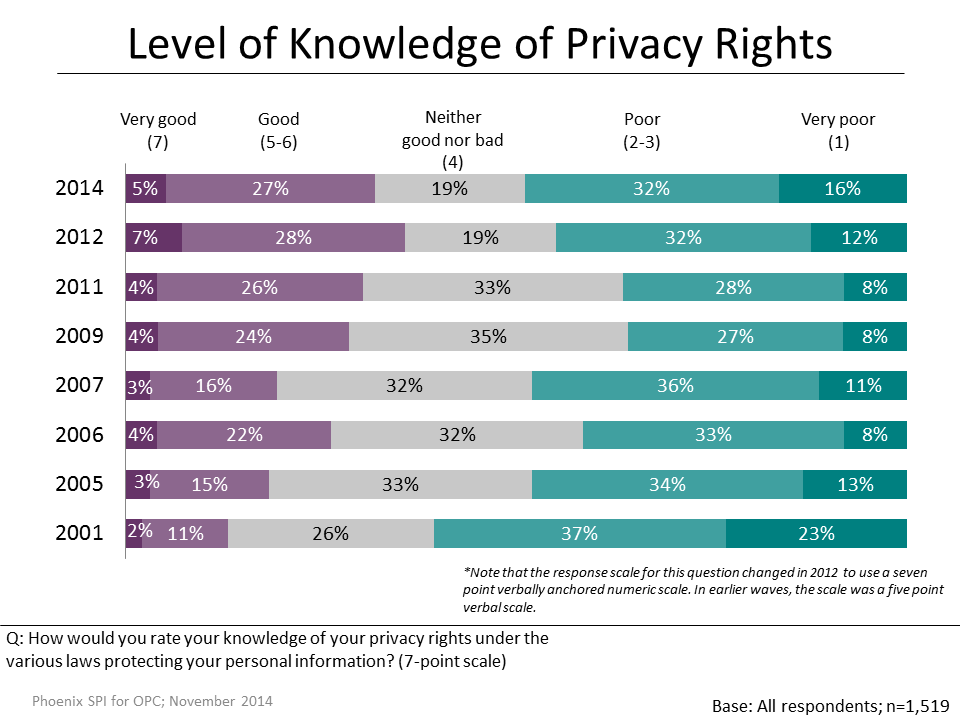
Text version of Figure 1
Figure 1. Level of Knowledge of Privacy Rights
Question: How would you rate your knowledge of your privacy rights under the various laws protecting your personal information? (7-point scale)
| Year | Very Good (7) | Good (5-6) | Neither Good nor Bad (4) | Poor (2-3) | Very Poor (1) |
|---|---|---|---|---|---|
| 2014 | 5% | 27% | 19% | 32% | 16% |
| 2012 | 7% | 28% | 19% | 32% | 12% |
| 2011 | 4% | 26% | 33% | 28% | 8% |
| 2009 | 4% | 24% | 35% | 27% | 8% |
| 2007 | 3% | 16% | 32% | 36% | 11% |
| 2006 | 4% | 22% | 32% | 33% | 8% |
| 2005 | 3% | 15% | 33% | 34% | 13% |
| 2001 | 2% | 11% | 26% | 37% | 23% |
Base: All respondents; n=1,519
*Note that the response scale for this question changed in 2012 to use a seven point verbally anchored numerical scale. In earlier waves, the scale was a five-point verbal scale.
Canadians Concerned About Protecting Personal Privacy
Nine in ten Canadians expressed some level of concern about the protection of their privacy, with just over one-third (34%) saying they are extremely concerned about this. Only 9% are not concerned about protecting personal privacy.
Figure 2: Level of Concern over Personal Privacy
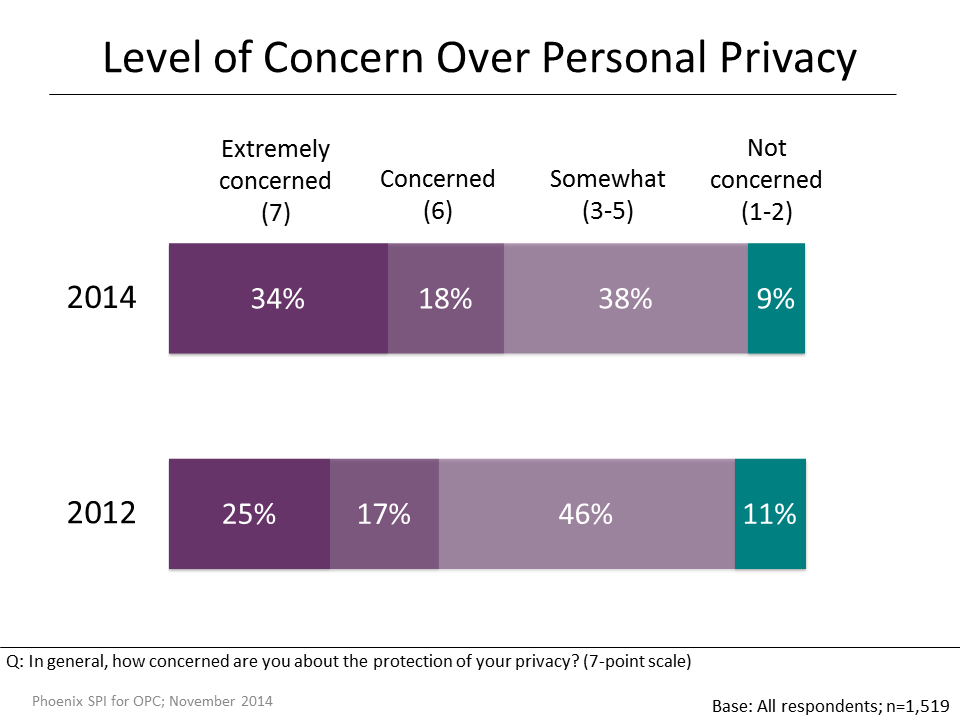
Text version of Figure 2.
Figure 2. Level of Concern over Personal Privacy
Question: In general, how concerned are you about the protection of your privacy? (7-point-scale)
| Year | Extremely Concerned (7) | Concerned (6) | Somewhat (3-5) | Not Concerned (1-2) |
|---|---|---|---|---|
| 2014 | 34% | 18% | 38% | 9% |
| 2012 | 25% | 17% | 46% | 11% |
Base: All respondents; n=1,519
The proportion of Canadians who rated their level of concern highly (6 or 7) has increased ten percentage points to 52% since 2012. The bulk of this increase can be seen in the increase of Canadians who are extremely concerned (up to 34% in 2014 from 25% in 2012).
Knowledge and Concern for Privacy Rights
When Canadians are segmented by their levels of knowledge and concern for their privacy rights, the following clusters emerge: 6% have high knowledge and low concern, 26% have high knowledge and high concern, 33% have low knowledge and high concern, and 16% have low knowledge and low concern.
Figure 3: Knowledge and Concern for Privacy Rights
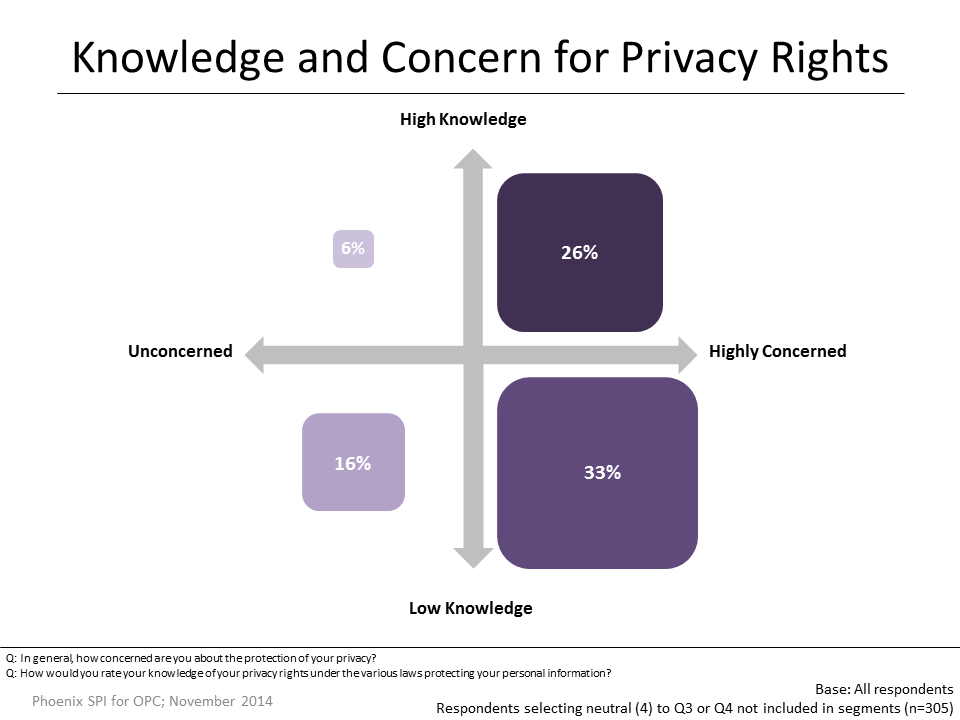
Text version of Figure 3.
Figure 3. Knowledge and Concern for Privacy Rights
When Canadians are segmented by their levels of knowledge and concern for their privacy rights, four clusters emerge.
Question 1: In general, how concerned are you about the protection of your privacy?
Question 2: How would you rate your knowledge of your privacy rights under the various laws protecting your personal information?
| Cluster | Knowledge | Concern | % |
|---|---|---|---|
| 1 | High Knowledge | Highly Concerned | 26% |
| 2 | High Knowledge | Unconcerned | 6% |
| 3 | Low Knowledge | Highly Concerned | 33% |
| 4 | Low Knowledge | Unconcerned | 16% |
Base: All respondents
Respondents selecting neutral (4) to Cluster 3 or Cluster 4 not included in segments; n=305
Canadians who have little knowledge about their privacy rights and high concern about privacy protection are more likely to be college-educated and less likely to trust government to handle their personal information. Conversely, those with low knowledge and concern about their privacy rights are more likely to be between 24 and 35 years of age and to reside in Quebec. Additionally, they are less likely to ask what a company does with their personal information or to seek out information on their privacy rights. Members of the high knowledge segments (high knowledge/low concern and high knowledge/high concern) did not differ from the Canadian population in terms of demographics, attitudes or behaviours.
There is also a link between knowledge and concern when looking at Canadians by age: that is, older Canadians are more likely to express higher concern for their privacy and better knowledge of their privacy rights than their younger counterparts. Canadians under 25 years of age stand out as having the lowest self-assessed concern for and understanding of their privacy rights. Conversely, Canadians 55 and over expressed the highest levels of concern over their privacy and knowledge of their privacy rights.
Figure 4: Knowledge and Concern by Age
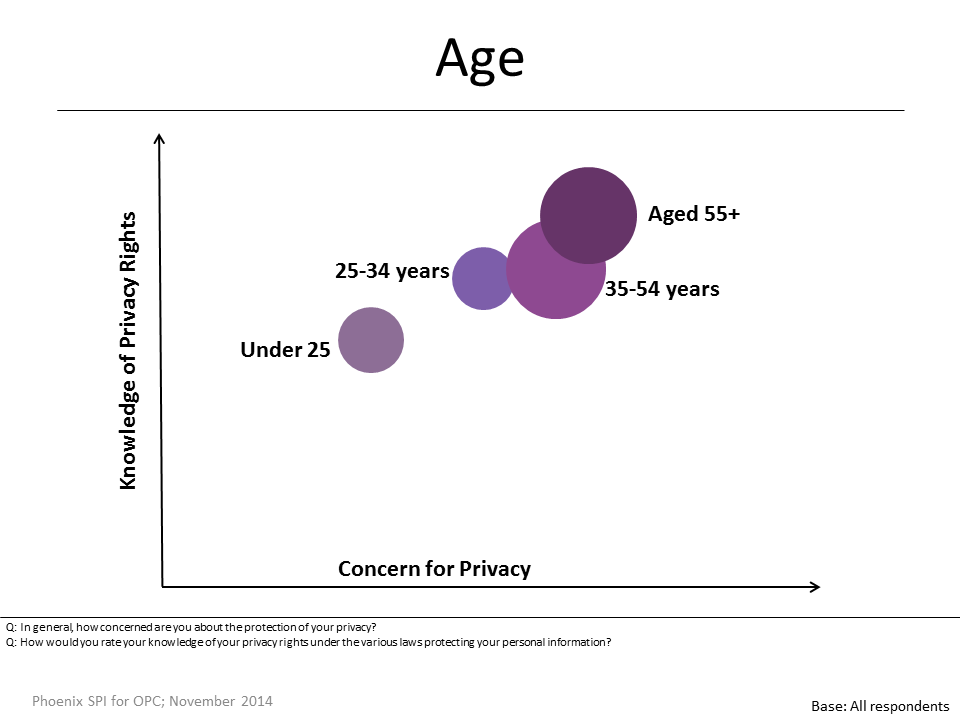
Text version of Figure 4.
Figure 4. Knowledge and Concern by Age
There is a link between knowledge and concern when looking at Canadians by age.
Question 1: In general, how concerned are you about the protection of your privacy?
Question 2: How would you rate your knowledge of your privacy rights under the various laws protecting your personal information?
| Age (years) | Concern for Privacy (x) Mean Value |
Knowledge of Privacy Rights (y) Mean Value |
% |
|---|---|---|---|
| Under 25 | 5 | 3 | 14% |
| 25-34 | 5 | 3 | 16% |
| 35-54 | 5 | 3 | 36% |
| 55+ | 6 | 4 | 34% |
Base: All respondents
The relationship between knowledge of and concern for one's privacy rights is less clear when looking at it from the perspective of educational attainment. Canadians with a trade certificate displayed a higher level of concern than university-educated Canadians, but they considered themselves to be less knowledgeable about their privacy rights. University graduates, on the other hand, were among the least likely to express concern and, together with college-educated Canadians, more apt to rate their knowledge positively.
Figure 5: Knowledge and Concern by Education
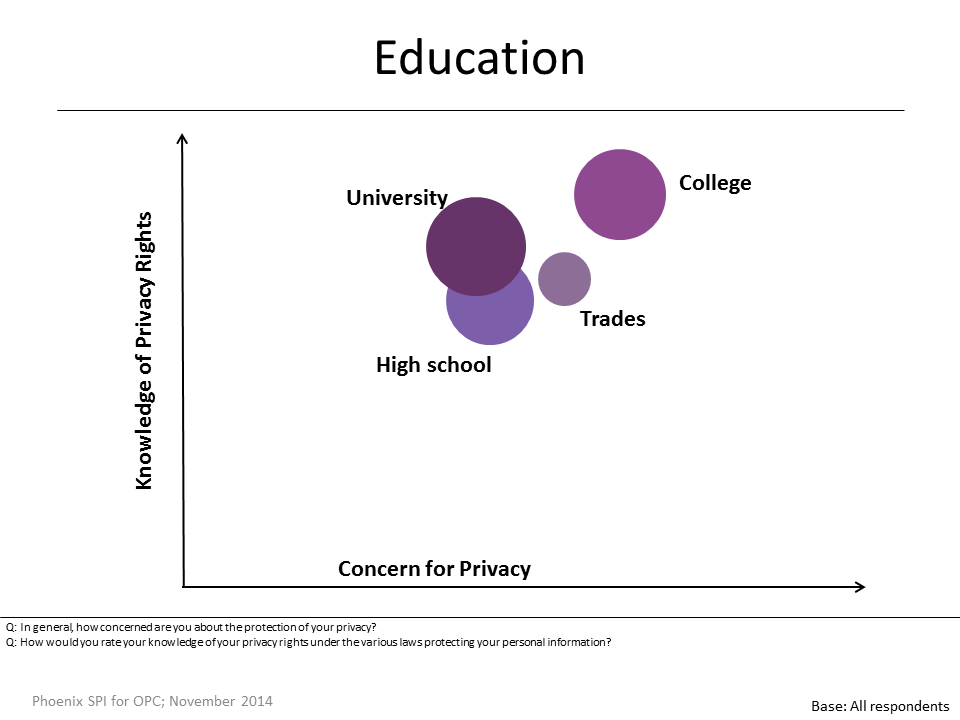
Text version of Figure 5.
Figure 5. Knowledge and Concern by Education
The relationship between knowledge of and concern for one's privacy rights is less clear when looking at it from the perspective of educational attainment.
Question 1: In general, how concerned are you about the protection of your privacy?
Question 2: How would you rate your knowledge of your privacy rights under the various laws protecting your personal information?
| Education | Concern for Privacy (x) Mean Value |
Knowledge of Privacy Rights (y) Mean Value |
% |
|---|---|---|---|
| High School | 5 | 3 | 25% |
| Trades | 5 | 3 | 9% |
| College | 6 | 4 | 32% |
| University | 5 | 4 | 7% |
Base: All respondents
Many See Privacy Breach As Real Possibility
Most Canadians feel that it is at least somewhat likely that their privacy may be breached by someone using their credit/debit card (78%), stealing their identity (78%), or accessing the personal information stored on their computer or mobile device (74%). A slightly higher proportion of Canadians felt that unauthorized use of their credit or debit card is very likely to happen to them compared to identity theft (41% vs. 33%).
Figure 6: Perceived Likelihood of Various Privacy Breaches
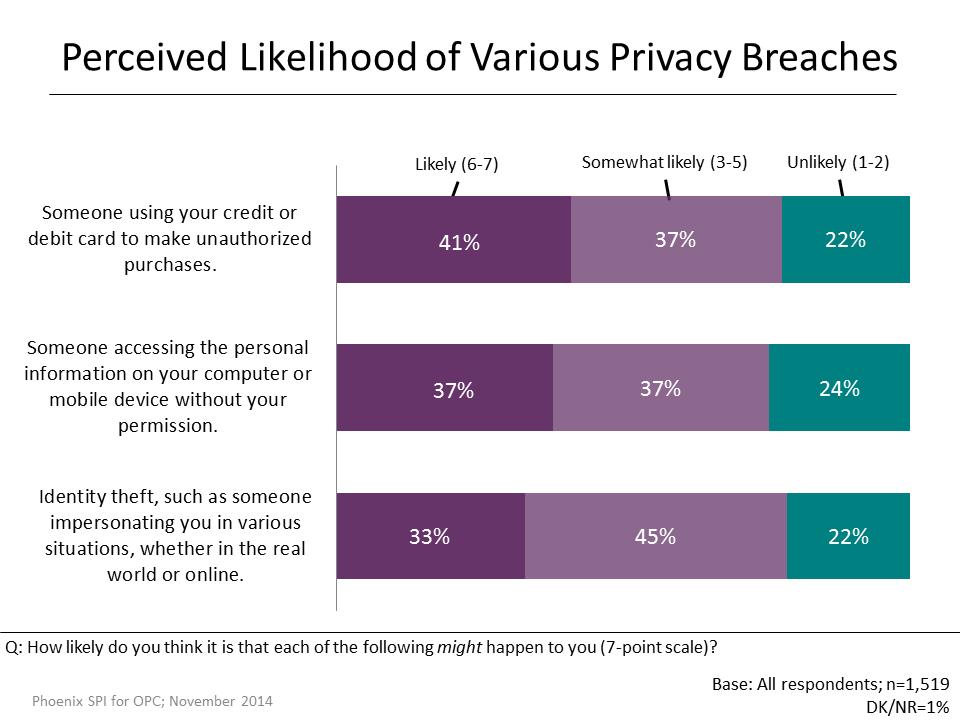
Text version of Figure 6.
Figure 6. Perceived Likelihood of Various Privacy Breaches
Question: How likely do you think it is that each of the following might happen to you? (7-point scale)
| Situation | Likely (6-7) | Somewhat likely(3-5) | Unlikely (1-2) |
|---|---|---|---|
| Someone using your credit or debit card to make unauthorized purchases. | 41% | 37% | 22% |
| Someone accessing the personal information on your computer or mobile device without your permission. | 37% | 37% | 24% |
| Identity theft, such as someone impersonating you in various situations, whether in the real world or online. | 33% | 45% | 22% |
Base: All respondents; n=1,519
DK/NR=1%
Women and Canadians aged 55+ were more apt to think that it is very likely that they might be affected by financial fraud or identity theft.
Moderate, But Widespread Concern for Emerging Risks to Privacy
With respect to emerging technologies or services that may present risks to Canadians' personal privacy, there was moderate, but widespread, concern about the following possibilities:
- 81%: results of genetic testing being used for non-health related purposes
- 75%: private citizens' or businesses' use of unmanned aerial vehicles
- 75%: black boxes used by auto insurance companies to record driving habits
- 70%: wearable computers that collect personal information from the wearer
When the focus is on strong concern, Canadians are more likely to be very concerned about the use of genetic testing results: 45% are very concerned about this risk to their privacy. In contrast, just one-third (33%) expressed strong concern about the potential risk presented by wearable computers collecting personal information.
The likelihood of expressing strong concern about all of these emerging risks to privacy was higher among Canadians aged 55+.
Figure 7: Concerns About Risks to Personal Privacy

Text version of Figure 7.
Figure 7. Concern About Risks to Personal Privacy
Question: Thinking about the risks to your personal privacy, how concerned would you be about the following?
| Situation | Concerned (6-7) | Somewhat concerned(3-5) | Not concerned(1-2) |
|---|---|---|---|
| Use of genetic testing results | 45% | 35% | 18% |
| Use of UAVs | 42% | 33% | 24% |
| Automobile black boxes* | 38% | 37% | 24% |
| Wearable computers* | 33% | 37% | 29% |
Base: All respondents; n=1,519
*Split sample; asked of half the sample
DK/NR=1%
2. Attitudes Towards Privacy and Related Issues
Many Not Confident about Knowledge of Privacy Implications of New Technologies
The majority of Canadians are not confident that they have enough information to know how new technologies might affect their personal privacy. While 43% agreed that they have enough information about this, 56% did not (41% disagreed outright with this premise and 15% were neutral). These findings are virtually identical to those of 2012, which marked the highest expression of lack of confidence related to this issue since tracking began in 2000.
Figure 8: Knowledge of How New Technologies Affect Privacy

Text version of Figure 8.
Figure 8. Knowledge of How New Technologies Affect Privacy
Question: Please rate the degree to which you agree or disagree with the following statement: “I feel confident that I have enough information to know how new technologies might affect my personal privacy.”
| Year | Agree (5-7) | Neutral (4) | Disagree (1-3) |
|---|---|---|---|
| 2014 | 43% | 15% | 41% |
| 2012 | 42% | 16% | 40% |
| 2011 | 43% | 24% | 31% |
| 2009 | 45% | 20% | 33% |
| 2007 | 51% | 16% | 32% |
| 2006 | 51% | 17% | 31% |
| 2005 | 47% | 17% | 34% |
| 2003 | 54% | 15% | 27% |
| 2001 | 53% | 16% | 27% |
| 2000 | 50% | 18% | 29% |
Base: All respondents; n=1,519
Demographically, the results for youth and residents of British Columbia differed from other Canadians.
Figure 9: Knowledge of How New Technologies Affect Privacy by Demographics
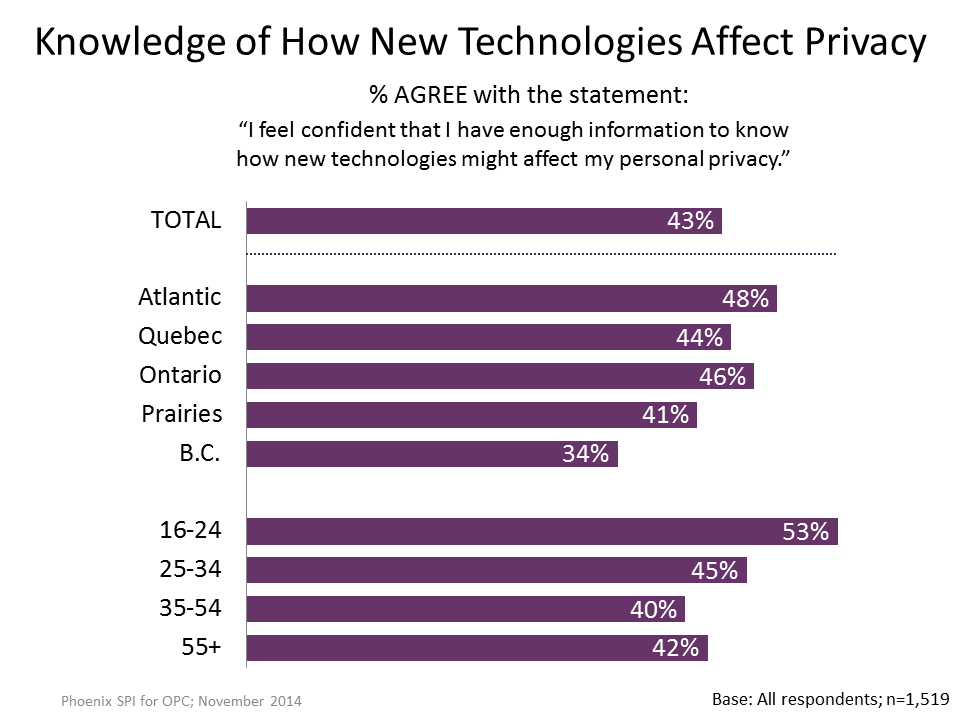
Text version of Figure 9.
Figure 9. Knowledge of How New Technologies Affect Privacy by Demographics
Question: % AGREE with the statement - "I feel confident that I have enough information to know how new technologies might affect my personal privacy."
Total: 43% agree.
| Region | % Agree |
|---|---|
| Atlantic | 48% |
| Quebec | 44% |
| Ontario | 46% |
| Prairies | 41% |
| British Columbia | 34% |
| Age | % Agree |
|---|---|
| 16 to 24 | 53% |
| 25 to 34 | 45% |
| 35 to 54 | 40% |
| 55 + | 42% |
Base: All respondents; n=1,519
Many Canadians Sense that Protection of Personal Information is Diminishing
More than seven in ten Canadians agreed that they feel they have less protection of their personal information in their daily lives than they did 10 years ago. This is the highest level of agreement with this statement since tracking began in 2005.
Figure 10: Protection of Personal Information Now vs. 10 Years Ago

Text version of Figure 10.
Figure 10. Protection of Personal Information Now vs. 10 Years Ago
Question: Please rate the degree to which you agree or disagree with the following statement: “I feel I have less protection of my personal information in my daily life than I did 10 years ago.”
| Year | Agree (5-7) | Neutral (4) | Disagree (1-3) |
|---|---|---|---|
| 2014 | 73% | 8% | 19% |
| 2012 | 71% | 11% | 17% |
| 2011 | 61% | 24% | 14% |
| 2009 | 60% | 16% | 23% |
| 2007 | 70% | 11% | 18% |
| 2006 | 71% | 11% | 16% |
| 2005 | 71% | 12% | 15% |
Base: All respondents; n=1,519
The likelihood of agreeing with this statement increased with age. Residents of Quebec were less likely than Canadians elsewhere to agree that they have less protection of their personal information now compared to 10 years ago.
Figure 11: Protection of Personal Information Now vs. 10 Years Ago-Tracking
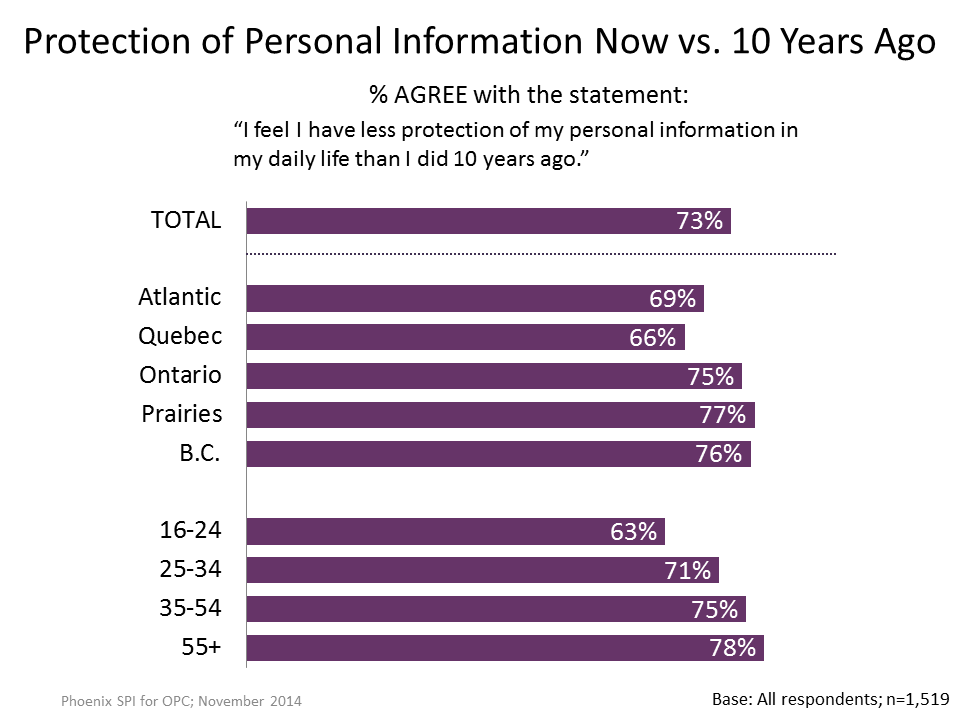
Text version of Figure 11.
Figure 11. Protection of Personal Information Now vs. 10 Years Ago
Question: % AGREE with the following statement: “I feel I have less protection of my personal information in my daily life than I did 10 years ago.”
Total: 73% agree.
| Region | % Agree |
|---|---|
| Atlantic | 69% |
| Quebec | 66% |
| Ontario | 75% |
| Prairies | 77% |
| British Columbia | 76% |
Base: All respondents; n=1,519
| Age Range | % Agree |
|---|---|
| 16-24 | 63% |
| 25-34 | 71% |
| 35-54 | 75% |
| 55+ | 78% |
Base: All respondents; n=1,519
Six in Ten Canadians Have Little Expectation of Privacy
Six in ten Canadians have little expectation of privacy today, either online or in the real world, because there are so many things that can compromise it. Demographically, residents of Quebec were less likely to agree with this premise, as were Canadians aged 25 to 34 years.
Figure 12: Expectations of Privacy
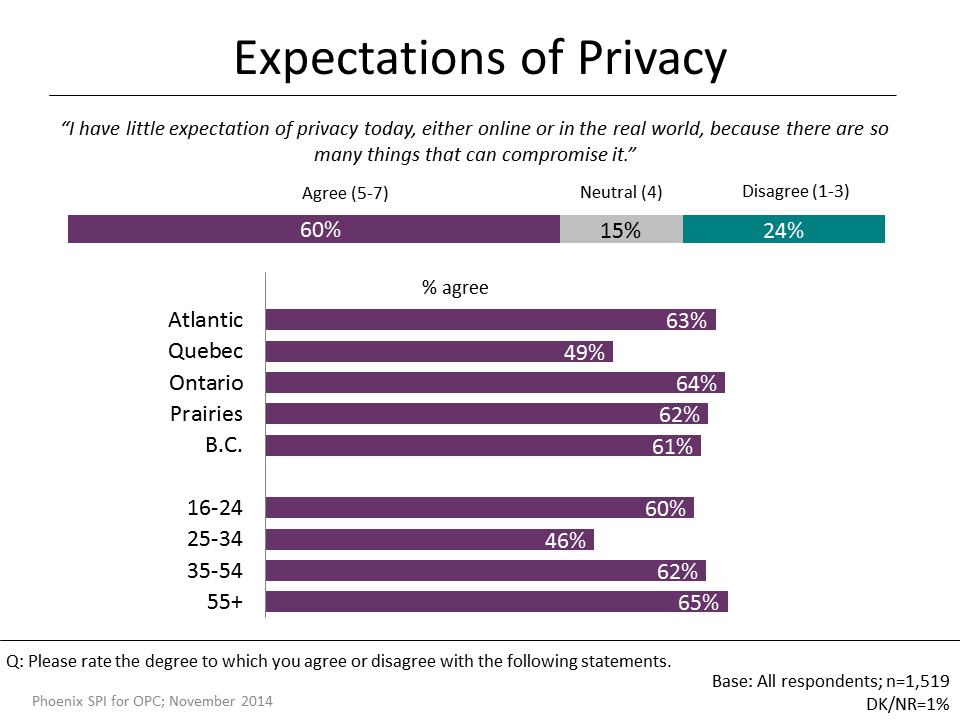
Text version of Figure 12.
Figure 12. Expectations of Privacy
Question: Please rate the degree to which you agree or disagree with the following statement: "I have little expectation of privacy today, either online or in the real world, becasue there are so many things that can compromise it.”
| Agree (5-7) | Neutral (4) | Disagree (1-3) |
|---|---|---|
| 60% | 15% | 24% |
| Region | % Agree |
|---|---|
| Atlantic | 63% |
| Quebec | 49% |
| Ontario | 64% |
| Prairies | 62% |
| British Columbia | 61% |
| Age Range | % Agree |
|---|---|
| 16-24 | 60% |
| 25-34 | 46% |
| 35-54 | 62% |
| 55+ | 65% |
Base: All respondents; n=1,519
DK/NR=1%
Nearly Half Confident They Know How Organizations Use Personal Information
Almost half (47%) the Canadians surveyed expressed confidence that when they share their personal information with an organization, they understand how it will be used by that organization.
Figure 13: Knowledge of How Organizations Use Personal Information

Text version of Figure 13.
Figure 13. Knowledge of How Organizations Use Personal Information
Question: Please rate the degree to which you agree or disagree with the following statement: "I feel confident that when I share my personal information with an organization, I understand how it will be used.”
| Agree (5-7) | Neutral (4) | Disagree (1-3) |
|---|---|---|
| 47% | 14% | 37% |
Base: All respondents; n=1,519
DK/NR=1%
Three in Ten Have Been Affected by an Organization's Lack of Privacy Protection
Respondents were asked to what extent they agree or disagree with the statement:
"I have been negatively affected as a result of an organization misusing, sharing or losing my personal information".
Three in ten Canadians (29%) agreed with the statement, with 14% agreeing strongly that they have been negatively affect by an organization's misuse, sharing or loss of their personal information. Conversely, the majority (62%) disagreed with the statement, with 43% expressing strong disagreement.
Figure 14: Misuse, Sharing or Loss of Personal information

Text version of Figure 14.
Figure 14. Misuse, Sharing or Loss of Personal Information
Question: Please rate the degree to which you agree or disagree with the following statements: “I have been negatively affected as a result of an organization misusing, sharing or losing my personal information.”
| Agree (5-7) | Neutral (4) | Disagree (1-3) |
|---|---|---|
| 29% | 7% | 62% |
Base: All respondents; n=1,519
DK/NR=2%
Mixed Perceptions of Federal Government and Businesses Privacy Performance
Canadians offered mixed perceptions of the seriousness that the federal government and businesses apply to their responsibilities to protect personal information. While 82% of Canadians think the federal government takes its responsibility to protect citizens' personal information at least somewhat seriously (scores of 3 or higher), only one in four (26%) said the government takes this responsibility very seriously (scores of 6 or 7).
Figure 15: Perceptions of Government's Commitment to Privacy Protection
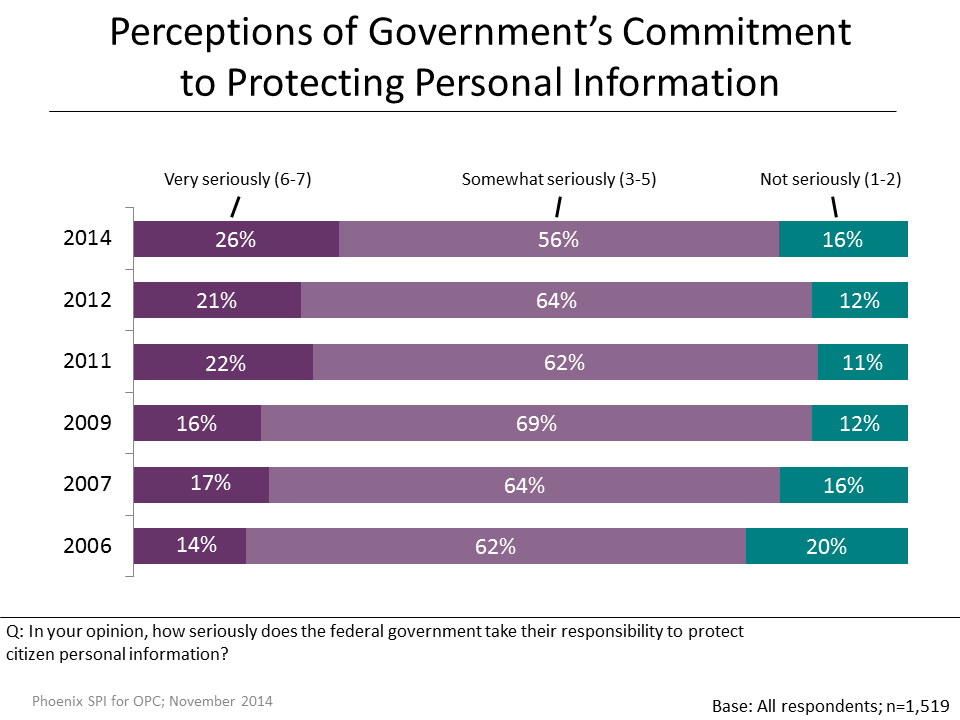
Text version of Figure 15.
Figure 15. Perceptions of Government's Commitment to Protecting Personal Information
Question: In your opinion, how seriously does the federal government take their responsibility to protect citizen personal information?
| Year | Very Seriously (6-7) | Somewhat seriously (3-5) | Not seriously (1-2) |
|---|---|---|---|
| 2014 | 26% | 56% | 16% |
| 2012 | 21% | 64% | 12% |
| 2011 | 22% | 62% | 11% |
| 2009 | 16% | 69% | 12% |
| 2007 | 17% | 64% | 16% |
| 2006 | 14% | 62% | 20% |
Base: All respondents; n=1,519
Over time, perceptions that government takes citizen privacy very seriously have gradually improved, from 14% in 2006 to 26% this year. At the same time, the proportion of Canadians who think the federal government does not take their privacy-related responsibilities seriously has risen four percentage points since 2012 putting it at the same level as it was in 2007.
Canadians' perceptions of how seriously businesses take their responsibility to protect consumer personal information are somewhat less favourable than for government. Only a relatively small proportion of Canadians (16%) said businesses are taking their privacy-related responsibilities very seriously (compared to 26% who think this about the federal government). That said, over time Canadians are significantly less likely to think that businesses are not taking their privacy responsibilities seriously (34% in 2006 vs. 15% in 2014).
Figure 16: Perceptions of Businesses' Commitment to Privacy Protection
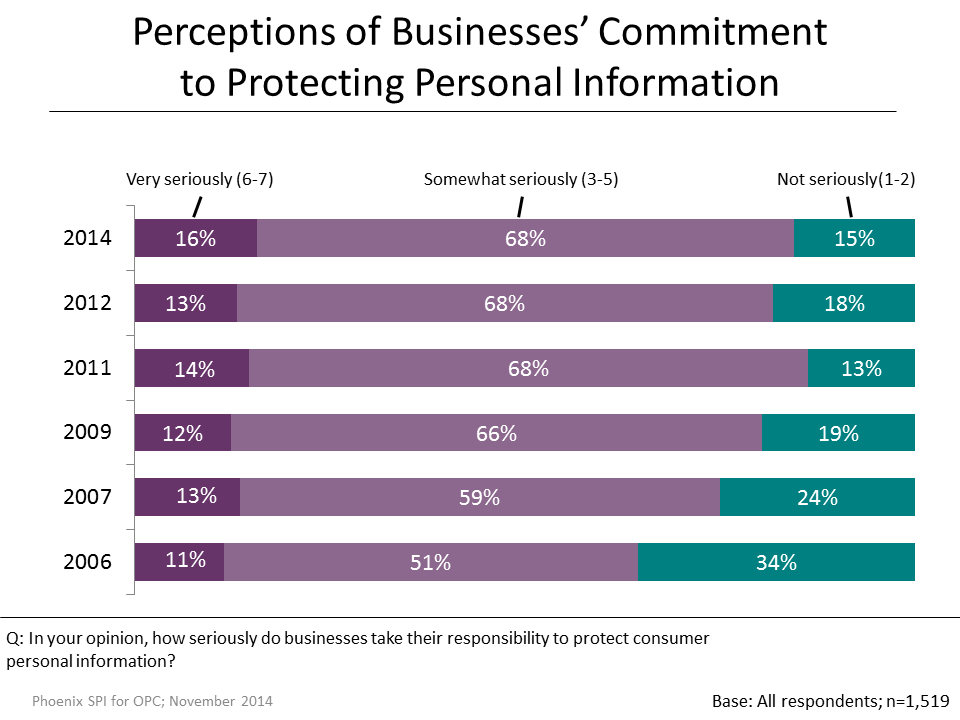
Text version of Figure 16.
Figure 16. Perceptions of Businesses' Commitment to Privacy Protection
Question: In your opinion, how seriously do businesses' take their responsibility to protect consumer personal information?
| Year | Very Seriously (6-7) | Somewhat seriously (3-5) | Not serious (1-2) |
|---|---|---|---|
| 2014 | 16% | 68% | 15% |
| 2012 | 13% | 68% | 18% |
| 2011 | 14% | 68% | 13% |
| 2009 | 12% | 66% | 19% |
| 2007 | 13% | 59% | 24% |
| 2006 | 11% | 51% | 34% |
Base: All respondents; n=1,519
3. Awareness of Privacy Institutions
Awareness of Federal Privacy Institutions Increases
Nearly half (49%) of Canadians expressed some awareness of federal institutions that help them with privacy and the protection of personal information from inappropriate collection, use and disclosure. Specifically, 39% said they are vaguely aware and 10% clearly aware of such institutions. Conversely, 51% of Canadians are not aware of any federal institutions.
Figure 17: Awareness of Federal Privacy Institutions
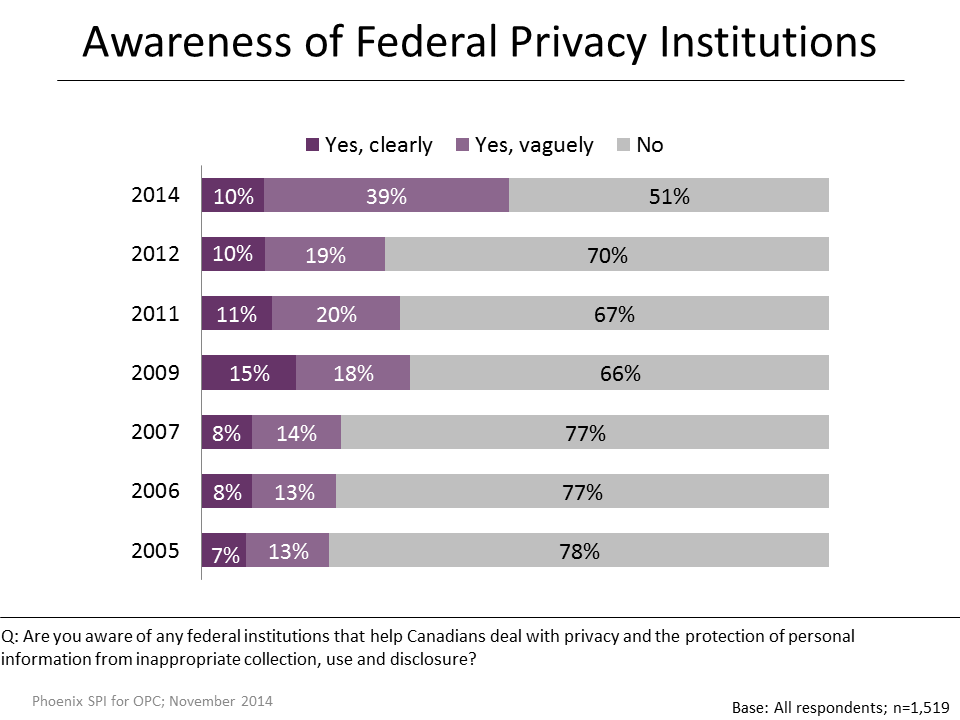
Text version of Figure 17.
Figure 17. Awareness of Federal Privacy Institutions
Question: Are you aware of any federal institutions that help Canadians deal with privacy and the protection of personal information from inappropriate collection, use and disclosure?
| Year | Yes, clearly | Yes, vaguely | No |
|---|---|---|---|
| 2014 | 10% | 39% | 51% |
| 2012 | 10% | 19% | 70% |
| 2011 | 11% | 20% | 67% |
| 2009 | 15% | 18% | 66% |
| 2007 | 8% | 14% | 77% |
| 2006 | 8% | 13% | 77% |
| 2005 | 7% | 13% | 78% |
Base: All respondents; n=1,519
Compared to previous years, significantly more Canadians said they are vaguely aware of federal privacy institutions. However, the proportion of Canadians that are clearly aware remains unchanged at 10%.
Demographically, awareness was higher in the Prairies and Ontario, as well as among Canadians 35 years of age and older.
Figure 18: Awareness of Federal Privacy Institutions-Tracking

Text version of Figure 18.
Figure 18. Awareness of Federal Privacy Institutions - Tracking
Total: 49% vaguely or clearly aware.
| Region | % vaguely or clearly aware |
|---|---|
| Atlantic | 43% |
| Quebec | 29% |
| Ontario | 57% |
| Prairies | 60% |
| British Columbia | 45% |
| Age Range | % vaguely or clearly aware |
|---|---|
| 16-24 | 44% |
| 25-34 | 36% |
| 35-54 | 54% |
| 55+ | 51% |
Canadians who claimed to be aware of a federal privacy institution were asked which one(s) they had heard of. Cited by 11% of these respondents, the Office of the Privacy Commissioner of Canada tops the list of federal privacy institutions. An additional 5% mentioned "an agency" but could not specify its name. In total, 46% did not or could not name any institution.
Figure 19: Unaided Awareness of Federal Privacy Institutions

Text version of Figure 19.
Figure 19. Unaided Awareness of Federal Privacy Institutions
Question: Which federal institution are you aware of?
| Federal Institution | % Aware |
|---|---|
| Office of the Privacy Commissioner of Canada | 11% |
| Access to Information and privacy legislation | 8% |
| Law enforcement or security agencies | 7% |
| Canada Revenue Agency | 6% |
| Recall agency, but not name | 5% |
| Banks (general) | 4% |
| Government health agencies | 4% |
| Government ombudsman | 4% |
| Federal Government (unspecified) | 3% |
| Consumer protection agencies | 3% |
| Other | 20% |
| Don't know / No response | 46% |
Base: those aware of federal institutions; n=748
Minority of Canadians Seek Information on Privacy Rights
Consistent with previous years, only about one in five Canadians have ever actively sought out information about their privacy rights. The likelihood of having sought information generally increased from east to west, from 14% of Atlantic Canadians to 25% of British Columbians.
Figure 20: Sought Information about Privacy Rights
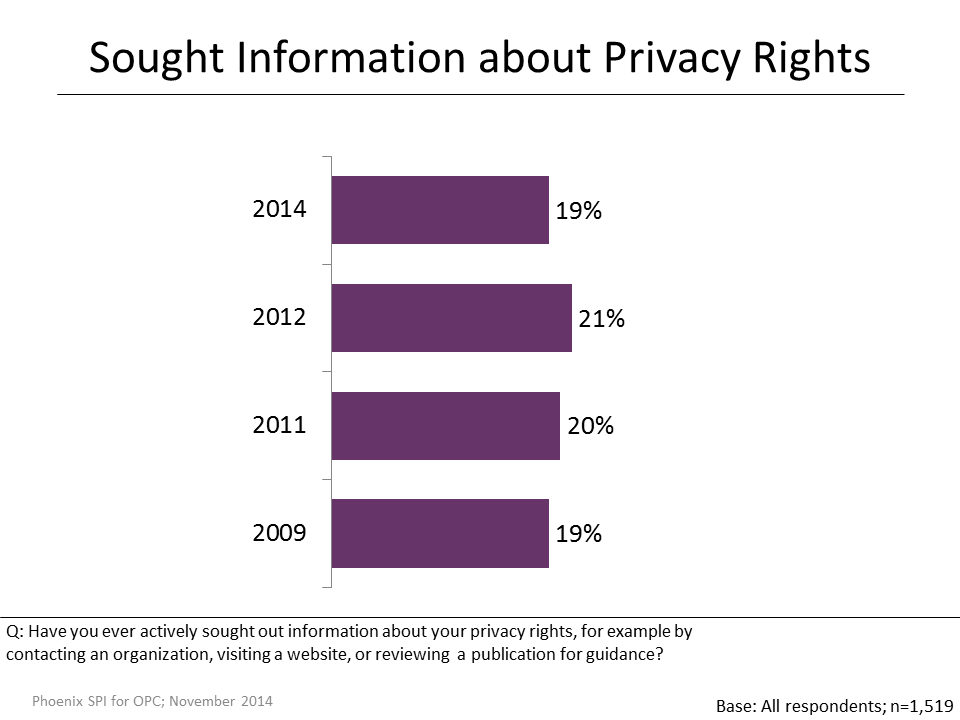
Text version of Figure 20.
Figure 20. Sought Information about Privacy Rights
Question: Have you ever actively sought out information about your privacy rights, for example, by contacting an organization, visiting a website, or reviewing a publication for guidance?
| Year | % of Respondents |
|---|---|
| 2014 | 19% |
| 2012 | 21% |
| 2011 | 20% |
| 2009 | 19% |
Base: All respondents; n=1,519
Internet-Most Common Information Source for Privacy
When asked where they had gone (or would go) for information about their privacy rights, exactly one-third (33%) of Canadians mentioned websites or the Internet. Following this, Canadians pointed to search engines (15%), a government website (15%), or government (12%).
Figure 21: Sources of Information on Privacy Rights

Text version of Figure 21.
Figure 21. Sources of Information on Privacy Rights
Question: Where did you / would you go for this information? (up to 2 responses accepted)
| Source | % of Respondents |
|---|---|
| Internet/websites | 33% |
| Search Engine (ex. Google) | 15% |
| Government Website | 15% |
| Government | 12% |
| Legal counsel | 6% |
| Friends, family, colleagues | 5% |
| Police/law enforcement | 4% |
| Federal privacy office | 4% |
| Provincial privacy office | 2% |
| Bank/credit card company | 2% |
| Other | 8% |
| Don't know / No response | 15% |
Base: All respondents; n=1,519
Fifteen percent did not, or would not, know where to go for information on privacy rights.
4. Online and Mobile Privacy
Canadians at Least Moderately Concerned about Personal Information Online
Internet users expressed mixed levels of concern about posting a range of information online. The majority are very concerned about posting information about their location, such as where they are at any given time, and contact information, such as their name, telephone number, address, and email address. Online, Canadians are least concerned about posting their personal opinions about people, issues and things. Concern tended to increase with age and was most pronounced when it came to personal photos or videos and information about social activities.
Figure 22: Concern about Posting Personal Information Online

Text version of Figure 22.
Figure 22. Concern about Posting Personal Information Online
Question: Many internet services, such as social media sites, blogs, or websites, allow people to post information about themselves. How concerned are you about posting the following types of information online?
| Type of Information | Very Concerned (6-7) | Somewhat concerned (3-5) | Not concerned (1-2) |
|---|---|---|---|
| Location Information | 59% | 25% | 15% |
| Contact Information | 56% | 32% | 12% |
| Photos or videos | 50% | 34% | 15% |
| Social activities | 43% | 39% | 17% |
| Personal opinion | 37% | 42% | 22% |
Base: Internet users; n=1,272
Not applicable removed; DK: 1% or less
The proportion of online Canadians very concerned about posting these different types of personal information has increased since 2012.
Figure 23: % Very Concerned – Year-to-Year Comparison
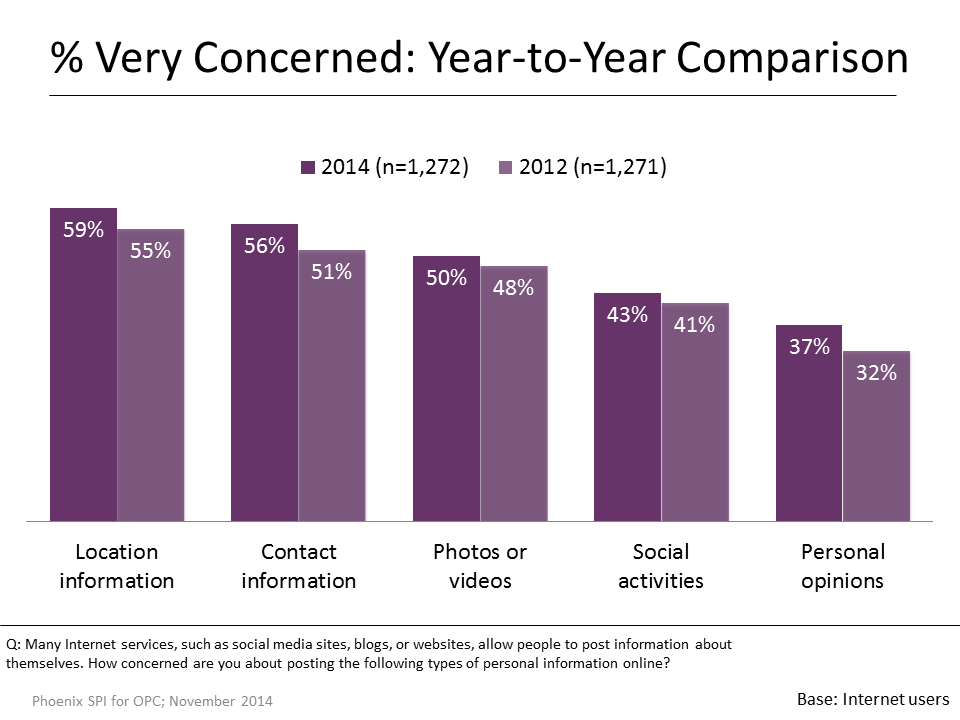
Text version of Figure 23.
Figure 23. % Very Concerned: Year-to-Year Comparison
Question: Many internet services, such as social media sites, blogs, or websites, allow people to post information about themselves. How concerned are you about posting the following types of information online?
| Type of Information | 2014 (n=1,272) |
2012 (n=1,271) |
|---|---|---|
| Location Information | 59% | 55% |
| Contact Information | 56% | 51% |
| Photos or videos | 50% | 48% |
| Social activities | 43% | 41% |
| Personal opinions | 37% | 32% |
Base: Internet users
Canadians Concerned About How Their Online Information May Be Used
Three-quarters or more of Internet users expressed some level of concern about the different ways the information available about them online might be used by organizations. At least four in ten, moreover, expressed a high level of concern (scores of 6-7 on a 7-point scale). Concern about personal information being used by companies to determine insurance or health coverage was highest, with exactly half expressing strong concern about this. Following this, 49% are very concerned about the impact on their personal reputation as more information is collected, assembled, and made into profiles about them.
Figure 24: Concern about How Online Personal Information Might be Used
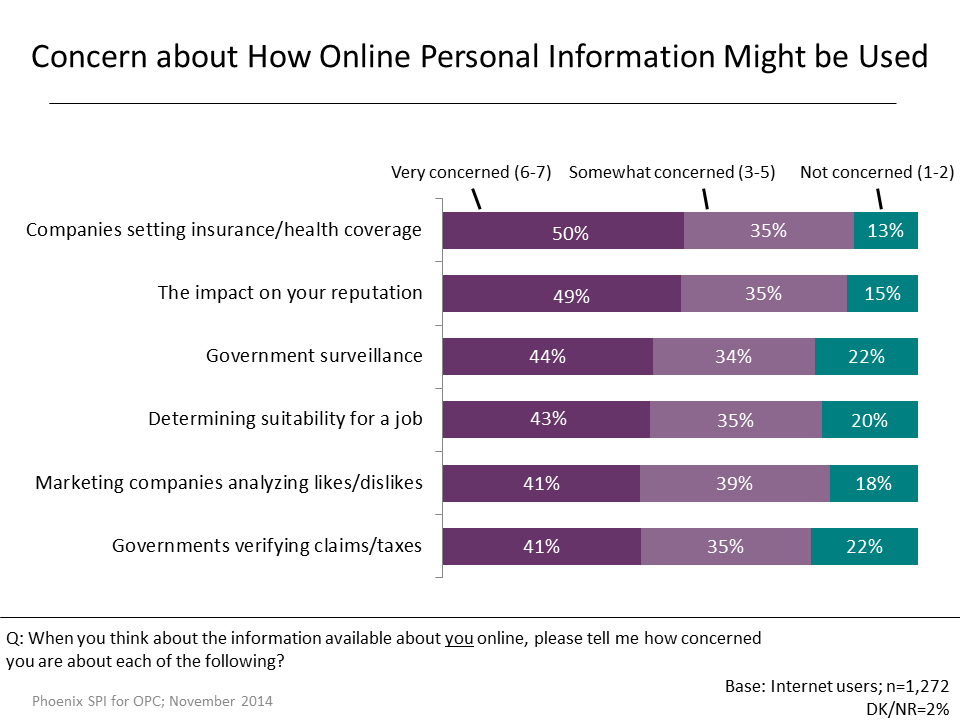
Text version of Figure 24.
Figure 24. Concern about How Online Personal Information Might be Used
Question: When you think about the information available about you online, how concerned you are about the following?
| Concern about: | Very Concerned (6-7) | Somewhat concerned (3-5) | Not concerned (1-2) |
|---|---|---|---|
| Companies setting insurance/health coverage | 50% | 35% | 13% |
| The impact on your reputation | 49% | 35% | 15% |
| Government surveillance | 44% | 34% | 22% |
| Determining suitability for a job | 43% | 35% | 20% |
| Marketing companies analyzing likes/dislikes | 41% | 39% | 18% |
| Government verifying claims/taxes | 41% | 35% | 22% |
Base: Internet users; n=1,272
DK/NR=2%
Similar proportions said they are very concerned about law enforcement and security agencies collecting their personal information for government surveillance purposes (44%) and companies or organizations using this information to determine their suitability for a job or promotion (43%). Canadians are less concerned about marketing companies using this information to analyze their likes and dislikes and governments using this information for other purposes, such as to verify claims for social benefits or payment of taxes.
These results are generally consistent with those from 2012. The one noteworthy difference is online Canadians' views about marketing companies using their personal information to analyze their online behaviours (48% were very concerned about this in 2012 compared to 41% this year).
Half Recalled Targeted Online Ads
Just over half (56%) of the Internet users surveyed recalled visiting a website and being presented with ads they thought were tailored to their interests. Demographically, the following Canadians were less likely to recall targeted online advertising: Quebeckers (43%), Canadians aged 55+ (48%), and those with a trades certificate (47%).
Respondents who recalled these targeted ads were asked to what extent they agreed or disagreed that the ads made them feel like they have less privacy online. Nearly two-thirds agreed that the ads made them feel like they had less privacy, with fully 49% agreeing strongly (scores of 6 or 7 on the 7-point scale).
Figure 25: Targeted Online Advertising
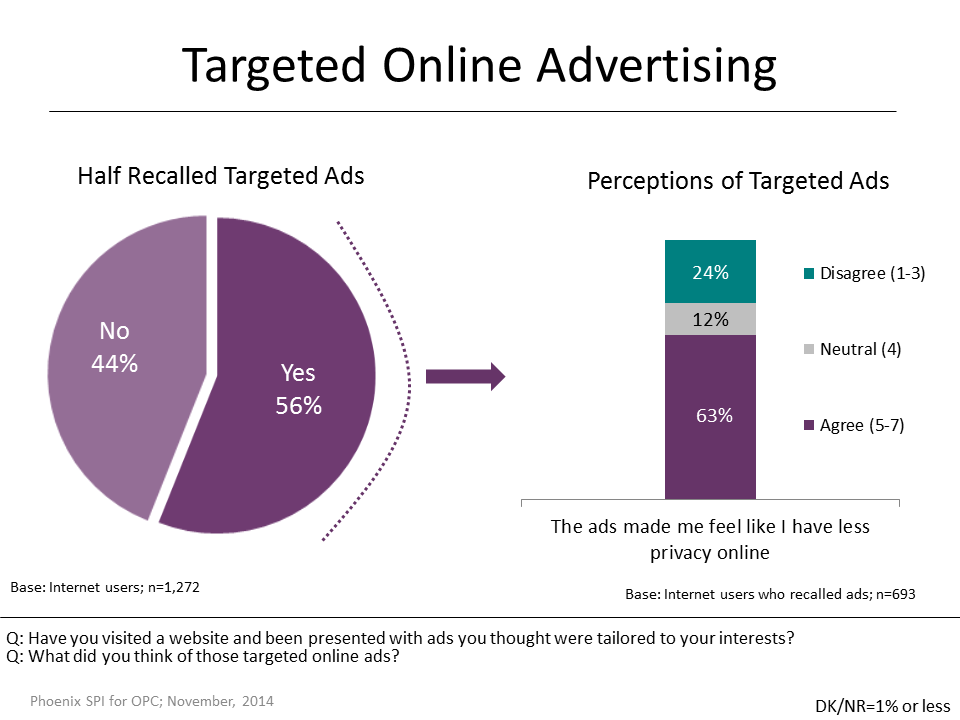
Text version of Figure 25.
Figure 25. Targeted Online Advertising
Question 1: Have you visited a website and been presented with ads you thought were tailored to your interests?
| Yes | No |
|---|---|
| 56% | 44% |
Base: Internet users; n=1,272
Question 2: What did you think of those targeted online ads?
Respondents who recalled these targeted ads were asked to what extent they agreed or disagreed that the ads made them feel like they have less privacy online.
| Disagree (1-3) | Neutral (4) | Agree (5-7) |
|---|---|---|
| 24% | 12% | 63% |
Base: Internet users who recalled ads; n=693
DK/NR=1% or less
Strong Concern for Personal Data on Mobile Devices
Three-quarters of Canadians who use a mobile device expressed concern about what might happen to the personal information stored on their device if it is lost or stolen, with nearly half (49%) saying they are extremely concerned. One in five are not very or not at all concerned that someone might use the personal information in a way that negatively affects them or someone they know.
Figure 26: Level of Concern Re: Personal Data on Mobile Devices
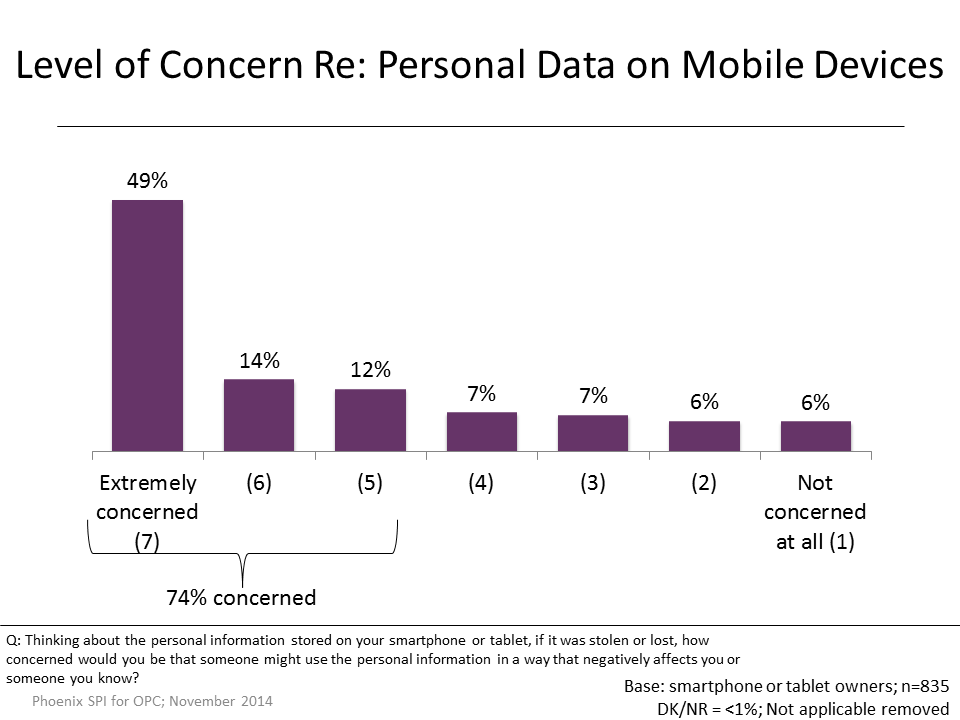
Text version of Figure 26.
Figure 26. Level of Concern Re: Personal Data on Mobile Devices
Question: Thinking about the personal information stored on your smartphone or tablet, if it was stolen or lost, how concerned would you be that someone might use the personal information in a way that negatively affects you or someone you know?
| Level of Concern | % of Concern |
|---|---|
| Extremely Concerned (7) | 49% |
| (6) | 14% |
| (5) | 12% |
| (4) | 7% |
| (3) | 7% |
| (2) | 6% |
| Not Concerned at all (1) | 6% |
Overall: 74% concerned
Base: smartphone or tablet owners; n=835
DK/NR=<1%; Not applicable removed
The likelihood of being extremely concerned about lost or stolen personal information was higher among residents of Quebec (58%) and Canadians aged 55+ (57%).
Majority Take Basic Security Precautions with Mobile Device
Mobile device users are increasingly likely to take security precautions on their mobile devices: 77% use a password lock on their smartphone or tablet (up from 56% in 2012) and 72% have adjusted settings on their device to limit the amount of personal information that they share with others (up from 53% in 2012). The likelihood of adjusting the settings on a smartphone or tablet increased as age decreased, from 63% of Canadians aged 55+ to 80% of Canadians 16 to 24 years old.
Figure 27: Security Precautions Taken on Mobile Device
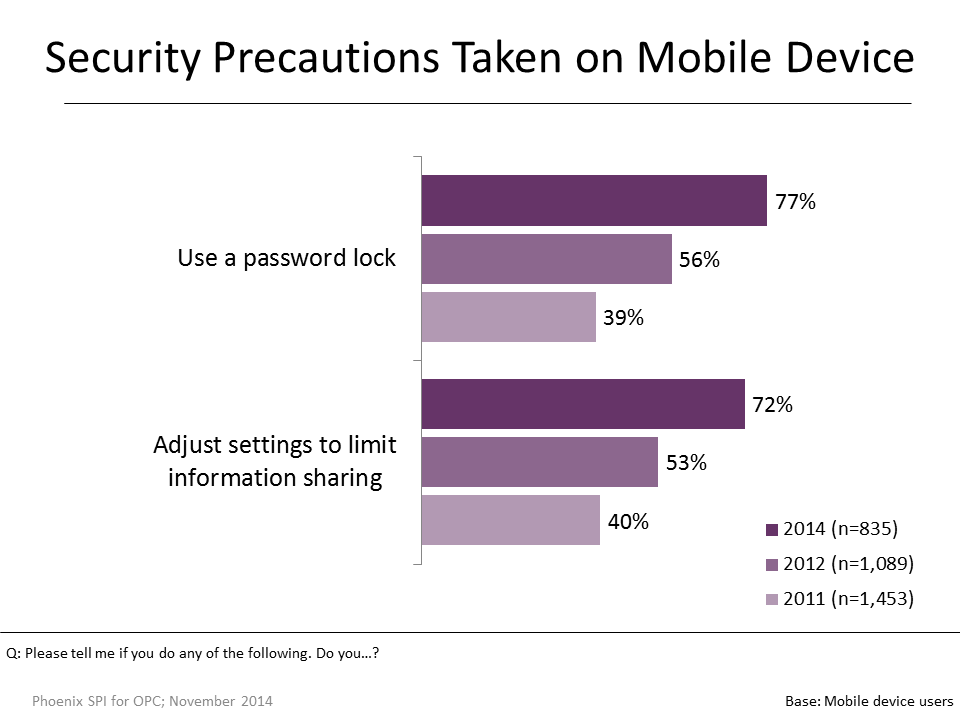
Text version of Figure 27.
Figure 27. Security Precautions Taken on Mobile Device
Question: Tell me if you do any of the following. Do you...
| Question | 2014 (n=835) |
2012 (n=1,089) |
2011 (n=1,453) |
|---|---|---|---|
| ...Use a password lock? | 77% | 56% | 39% |
| ...Adjust settings to limit information sharing? | 72% | 53% | 40% |
Base: Mobile device users
In addition, exactly three-quarters of mobile device users have decided not to install, or uninstalled, an app because they were concerned about the personal information they would have to provide (up from 55% in 2012). Fewer, but still a majority, have turned off the location tracking feature on their mobile device because they were concerned about others accessing that information (58% up from 38% in 2012). Canadians aged 55+ (44%) and residents of Quebec (49%) are less likely to have turned off the location tracking feature.
Figure 28: Actions Taken to Protect Personal Information on Mobile Device

Text version of Figure 28.
Figure 28. Actions Taken to Protect Personal Information on Mobile Device
Question: Have you ever...
| Question | 2014 (n=835) |
2012 (n=1,089) |
|---|---|---|
| ...decided not to install an app because of concerns about the personal information requested?* | 75% | 55% |
| ...turned off the location tracking feature on a mobile device because of concerns about others accessing that information? | 58% | 38% |
*Statement modified slightly in 2014
Base: Mobile device users
DK/NR=1%
Fewer than One in Five Negatively Affected by Online Post
Few online Canadians (17%) said they, or someone they know, have had something posted about them online that has negatively affected their lives in some way. Of those who had been affected by a posting about them, exactly one-third did nothing to resolve the situation. Those who took some action were most likely to have removed the post themselves (24%), or to have asked the poster to remove the content (21%).
Figure 29: Negative Effects of Online Posting
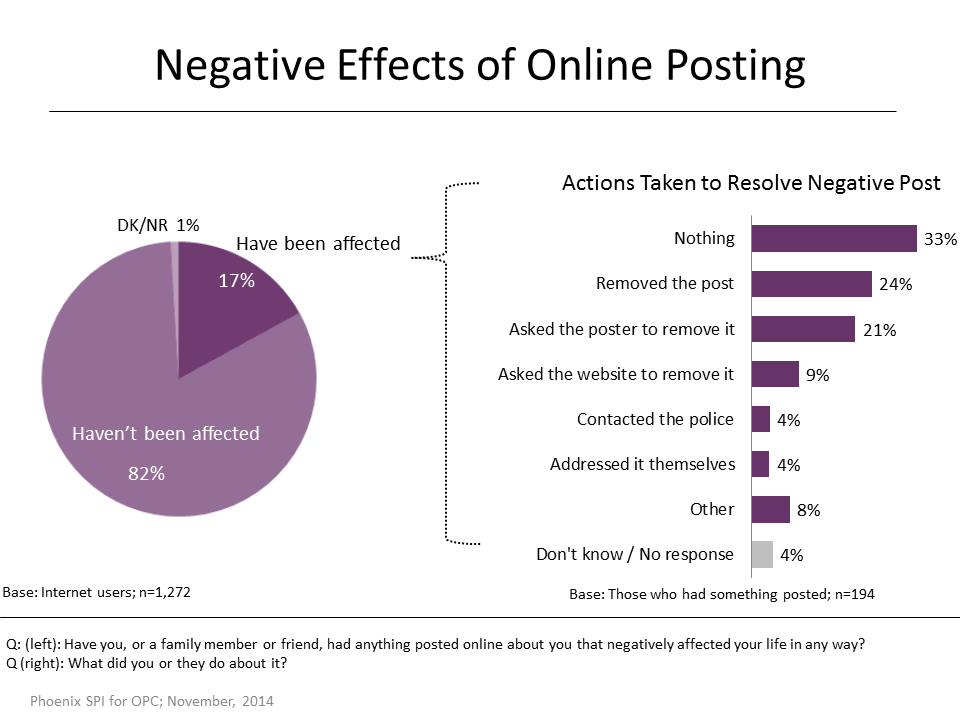
Text version of Figure 29.
Figure 29. Negative Effects of Online Posting
Question 1: Have you or a family member or friend, had anything posted online about you that negatively affected your life in any way?
| Response | % of Respondents |
|---|---|
| Have been affected | 17% |
| Haven't been affected | 82% |
| Don't know / No response | 1% |
Base: Internet users; n=1,272
Question 2: What did you or they do about it?
| Action Taken | % of Respondents |
|---|---|
| Nothing | 33% |
| Removed post | 24% |
| Asked the poster to remove it | 21% |
| Asked the website to remove it | 9% |
| Contacted the police | 4% |
| Addressed it themselves | 4% |
| Other | 8% |
| Don't Know / No response | 4% |
Those who had something posted; n=194
The likelihood of being affected by online postings increased as age decreased, from 8% of Canadians 55+ to 29% of 16 to 24 year olds.
5. Personal Information Management
Canadians Reluctant to Share Personal Information after News Reports of Breaches
Most Canadians feel a greater reluctance to share their personal information with organizations in light of recent news reporting of sensitive information, such as private photos or banking information, being lost, stolen or made public. Seventy-eight percent said these incidents have affected their willingness to share personal information with organizations at least somewhat (scores of 3 or more), with three in ten (31%) saying their willingness has been affected a great deal.
Figure 30: Willingness to Share Personal Information
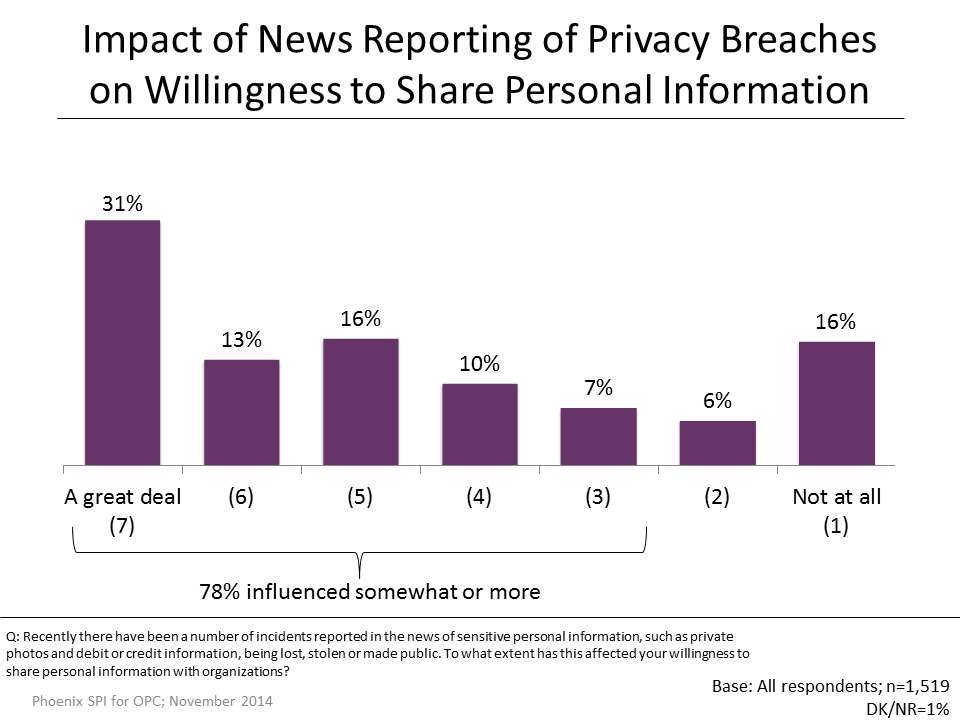
Text version of Figure 30.
Figure 30. Willingness to Share Personal Information
Question: Recently, there have been a number of incidents reported in the news of sensitive personal information, such as private photos and debit or credit card information, being lost, stolen or made public. To what extent has this affected your willingness to share personal information with organizations?
| Level of Concern (7-point scale) | % of Respondents |
|---|---|
| A great deal (7) | 31% |
| (6) | 13% |
| (5) | 16% |
| (4) | 10% |
| (3) | 7% |
| (2) | 6% |
| Not at all (1) | 16% |
78% influenced somewhat or more
Base: All respondents; n=1,519
DK/NR=1%
Canadians 35 years of age and older were far more likely than those under 25 to say this has affected them a great deal: 26% of 16 to 24 years compared to 46% of 35 to 54 year olds and 52% of Canadians aged 55+.
Canadians More Likely to Refuse to Provide Info than to Ask How It is Used
Approximately three-quarters (77%) of Canadians said they have refused to provide an organization with their personal information at one point in time. Residents of British Columbia (86%) and 35 to 54 year olds (83%) were more apt to have done this.
When asked if, in the last year or so, respondents have asked a company how it uses or protects their personal information before doing business with them, only (29%) said they had done so. Demographically, the likelihood of asking a company about its privacy practices was higher among those from the Prairies (40%), 16 to 24 year olds (40%), and women (32%).
Of those who have asked a company how it uses or protects their personal information, a strong minority (43%), in the end, chose to not do business with the company as a result of their privacy policy.
Figure 31: Personal Information Management
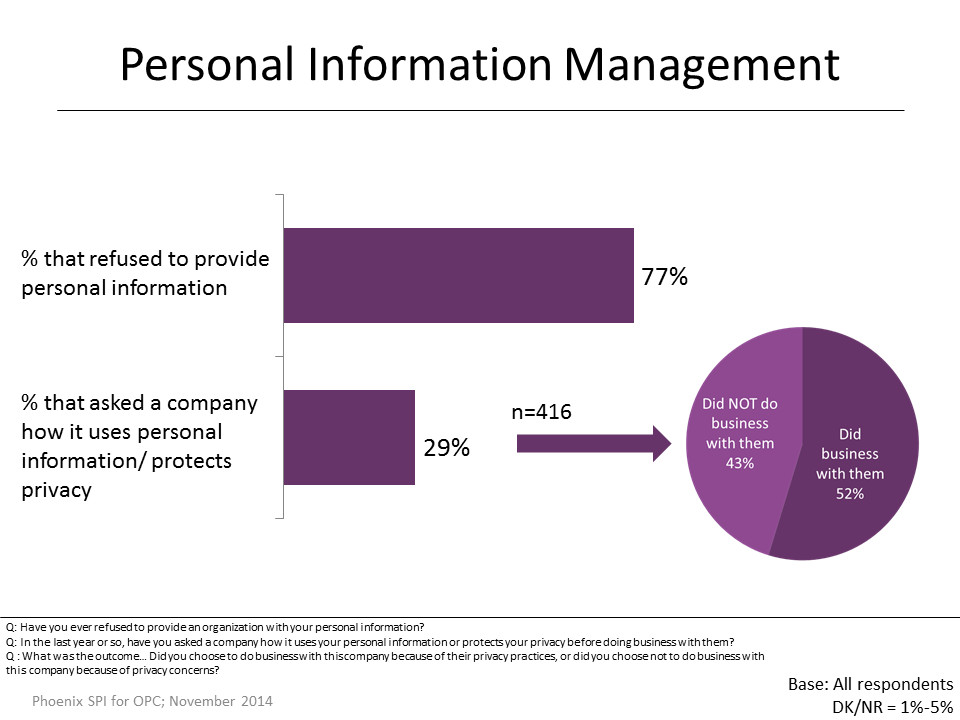
Text version of Figure 31.
Figure 31. Personal Information Management
Question 1: Have you ever refused to provide an organization with your personal information?
| Response | % of Respondents |
|---|---|
| Yes | 77% |
Base: All respondents
DK/NR=1%-5%
Question 2: In the last year or so, have you asked a company how it uses your personal information or protects your privacy before doing business with them?
| Response | % of Respondents |
|---|---|
| Yes | 29% |
Question 3. What was the outcome? Did you choose to do business with this company because of their privacy practices, or did you choose not to do business with this company because of privacy concerns?
| Response | % of Respondents |
|---|---|
| Did NOT do business with them | 43% |
| Did business with them | 52% |
Base: All respondents
DK/NR = 1%-5%
Company Reputation More Important Than Actual Information Collection Practices
Canadians surveyed were more likely to say they would choose to do business with a company specifically because it has a good reputation for privacy practices (81%) than because it does not collect personal information (53%).
Figure 32: Factors Influencing Decision to do Business
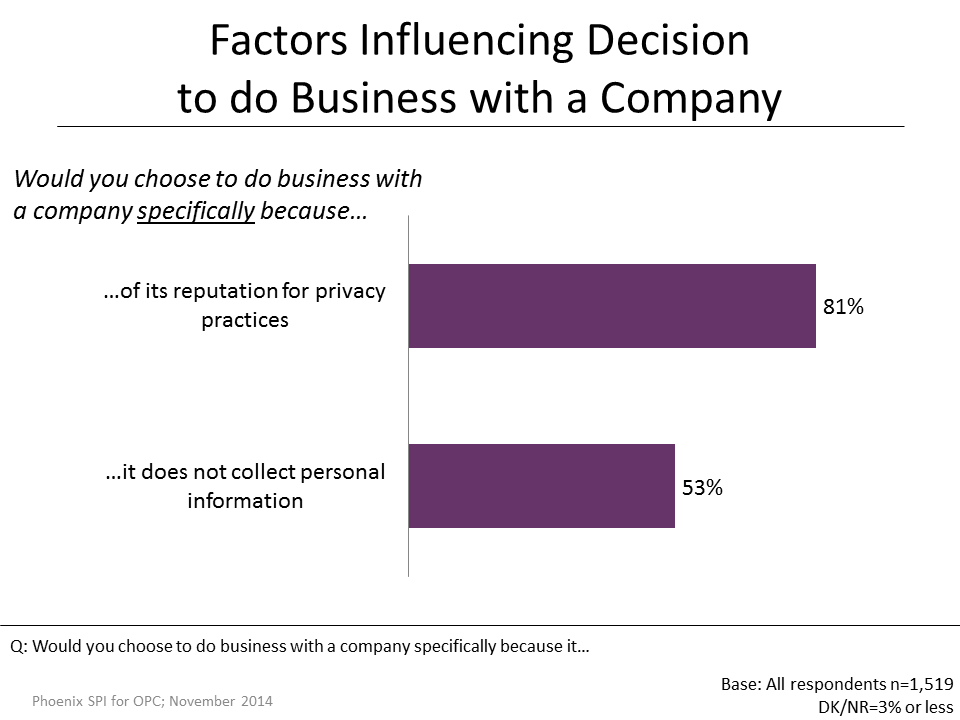
Text version of Figure 32.
Figure 32. Factors Influencing Decision to do Business
Question: Would you choose to do business with a company specifically because...
| Question | % of Respondents |
|---|---|
| ...of its reputation for privacy practices? | 81% |
| ...it does not collect personal information? | 53% |
Base: All respondents n=;1,519
DK/NR = 3% or less
Demographically, the results indicate Quebeckers were less likely than Canadians in other parts of the country to say they would choose to do business with a company specifically because of its good reputation for privacy practices or its practice of not collecting personal information.
Figure 33: Factors Influencing Decision by Demographics
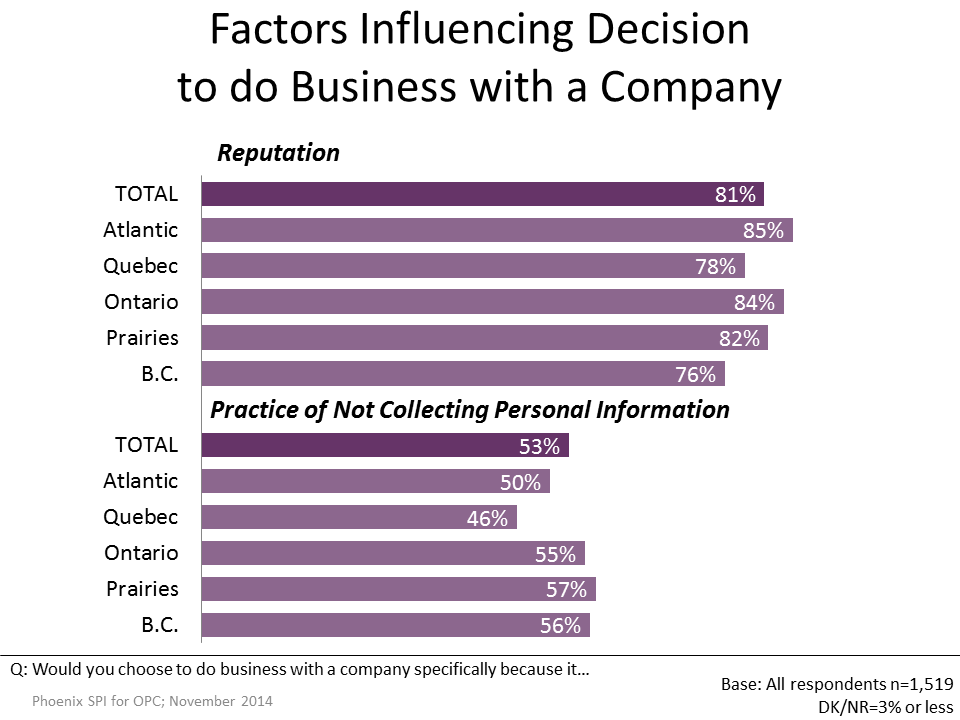
Text version of Figure 33.
Figure 33. Factors Influencing Decision to do Business with a Company by Demographics
Question 1: Would you choose to do business with a company specifically because of its reputation for privacy practices?
Total: 81% influenced by company reputation.
| Region | % Influenced by Company Reputation |
|---|---|
| Atlantic | 85% |
| Quebec | 78% |
| Ontario | 84% |
| Prairies | 82% |
| British Columbia | 76% |
Question 2: Would you choose to do business with a company specifically because of its practice of NOT Collecting Personal Information?
Total: 53% influenced by company practice of NOT collecting personal information.
| Region | % Influenced by Company Practice of NOT Collecting Personal Information |
|---|---|
| Atlantic | 50% |
| Quebec | 46% |
| Ontario | 55% |
| Prairies | 57% |
| British Columbia | 56% |
Base: All respondents; n=1,519
DK/NR=3% or less
6. Government, National Security and Public Safety
Moderate Awareness of Surveillance and Intelligence Gathering
Nearly half (49%) of Canadians have seen, read, or heard something about surveillance or intelligence gathering activities for the purposes of national security in the past year or so. An additional 7% said they may recall something, but they could not be certain. Taken together, 56% of Canadians have some awareness of surveillance and intelligence gathering activities. Demographically, the results indicate that Quebeckers were less likely to say they had seen, read, heard anything about surveillance or intelligence gathering and university-educated respondents were more apt to recall something.
Figure 34: Recall of Surveillance and Intelligence Gathering Activities

Text version of Figure 34.
Figure 34. Recall of Surveillance and Intelligence Gathering Activities
Question: In the past year or so, have you seen, read or heard anything about surveillance and intelligence gathering activities for the purpose of national security?
Total: 49% recall surveillance and intelligence gathering activities.
| Region | % saying "yes" |
|---|---|
| Atlantic | 53% |
| Quebec | 33% |
| Ontario | 54% |
| Prairies | 53% |
| British Columbia | 58% |
| Education Level | % saying "yes" |
|---|---|
| Highschool | 51% |
| Trades | 48% |
| College | 56% |
| University | 61% |
Base: All respondents; n=1,519
Among those who recalled something, 53% said they know at least a moderate amount about what information is collected, used, or disclosed by intelligence gathering activities in Canada (only 7% understand a great deal). Younger Canadians (those 16 to 24 years) (68%) were more likely to describe their understanding as moderate or great.
Figure 35: Understanding of Intelligence Gathering Activities in Canada
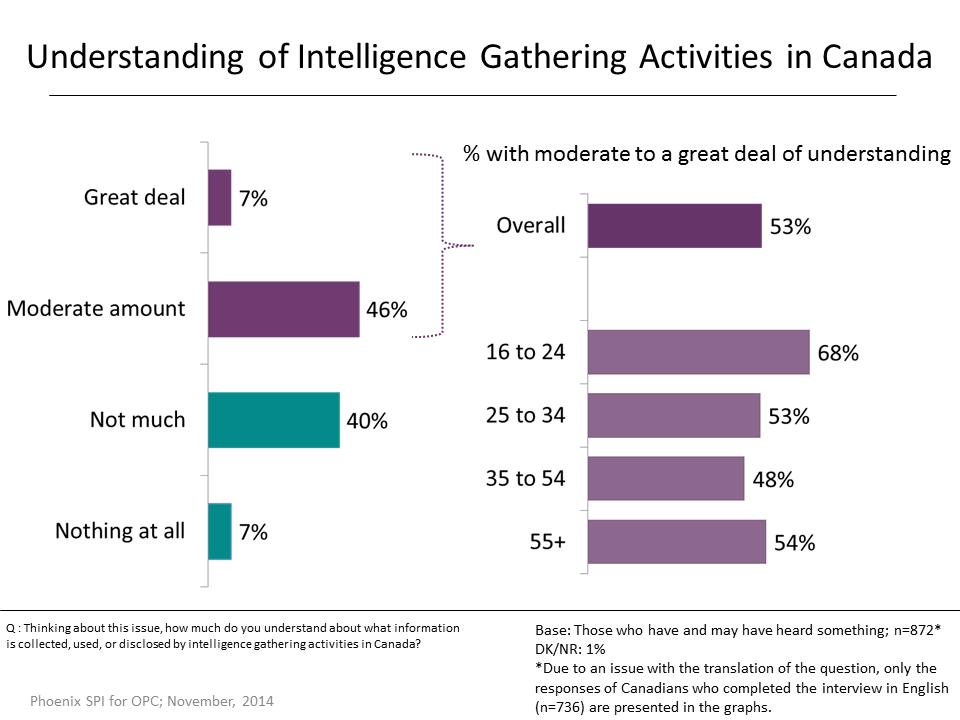
Text version of Figure 35.
Figure 35. Understanding of Intelligence Gathering Activities in Canada
Question: Thinking about this issue, how much do you understand about what information is collected, used, or disclosed by intelligence gathering activities in Canada?
| Great Deal | Moderate Amount | Not Much | Nothing at all |
|---|---|---|---|
| 7% | 46% | 40% | 7% |
Overall, 53% have a moderate to great deal of understanding.
| Age | % have an understanding of Intelligence Gathering Activities in Canada |
|---|---|
| 16 to 24 | 68% |
| 25 to 34 | 53% |
| 35 to 54 | 48% |
| 55 + | 54% |
Base:Those who have and may have heard something; n=872*
DK/NR=1%
*Due to an issue with the translation of the question, only the responses of Canadians who completed the interview in English (n=736) are presented in the graphs.
The vast majority (89%) of those who had heard something about government surveillance activities agreed that surveillance or intelligence gathering agencies should have to explain their activities to Canadians. A demographical analysis indicates that Canadians living in Quebec and Canadians under 35 years of age were more likely to feel this way.
Some Confidence in Government's Handling of Personal Information
Half of Canadians are confident that the government will take seriously any concerns they might have about the government's handling of their personal information (52%) and that the personal information shared with the government will not be misused, lost, or stolen (51%). Only 27%, however, feel they have a good understanding of what the government does with the personal information it collects.
Figure 36: Attitudes Toward Government Collection/Use of Personal Information
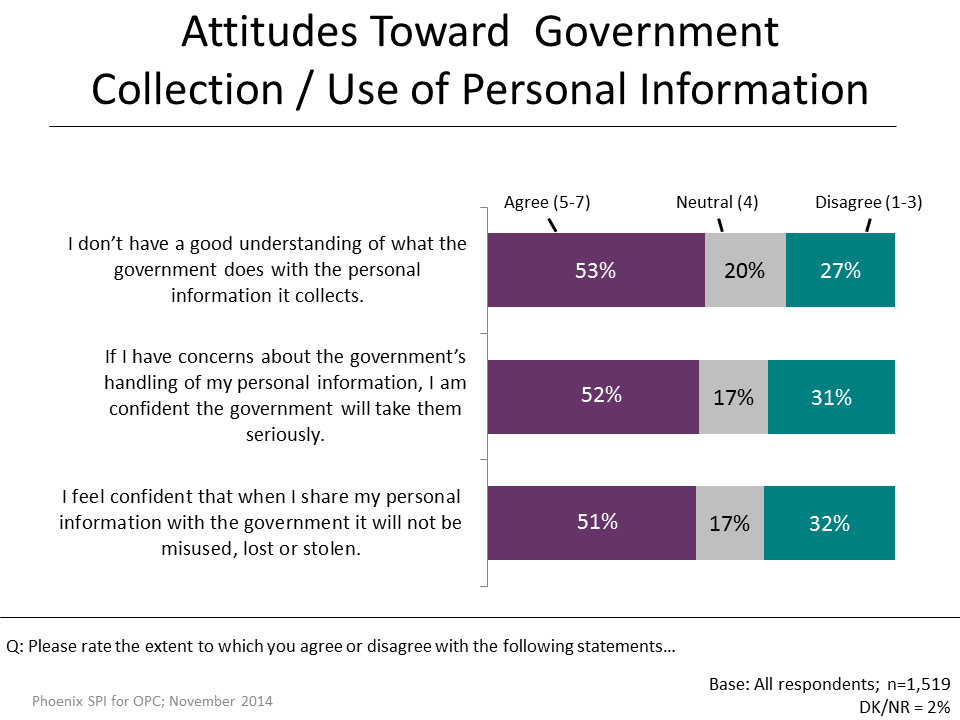
Text version of Figure 36.
Figure 36. Attitudes Toward Government Collection / Use of Personal Information
Question: Please rate the extent to which you agree or disagree with the following statements...
| Statement | Agree (5-7) | Neutral (4) | Disagree (1-3) |
|---|---|---|---|
| I don't have a good understanding of what the government does with the personal information it collects. | 53% | 20% | 27% |
| If I have concerns about the government's handling of my personal information, I am confident the government will take them seriously. | 52% | 17% | 31% |
| I feel confident that when I share my personal information with the government, it will not be misused, lost or stolen. | 51% | 17% | 32% |
Base: All respondents; n=1,519
DK/NR=2%
Warrantless Information Requests Top List of Concerns
Canadians expressed varying levels of comfort with different ways in which government departments and agencies, including intelligence gathering organizations, could collect or share their personal information. Canadians are least likely to be comfortable with the government requesting telecommunications companies to provide personal information they hold about individuals without a warrant. Just over half (57%) said they are not comfortable with warrantless information requests. The rest are somewhat (26%) or very (16%) comfortable with this practice.
Canadians are most likely to be comfortable with the use of video or audio surveillance cameras in public places for the purposes of law enforcement and public safety. Nearly half (47%) of Canadians said they are very comfortable with this, and an additional 37% are somewhat comfortable with this type of surveillance. In total, 84% of Canadians are at least moderately comfortable with video/audio surveillance for the purposes of law enforcement and public safety.
Figure 37: Level of Comfort with Government Information Sharing/Collection
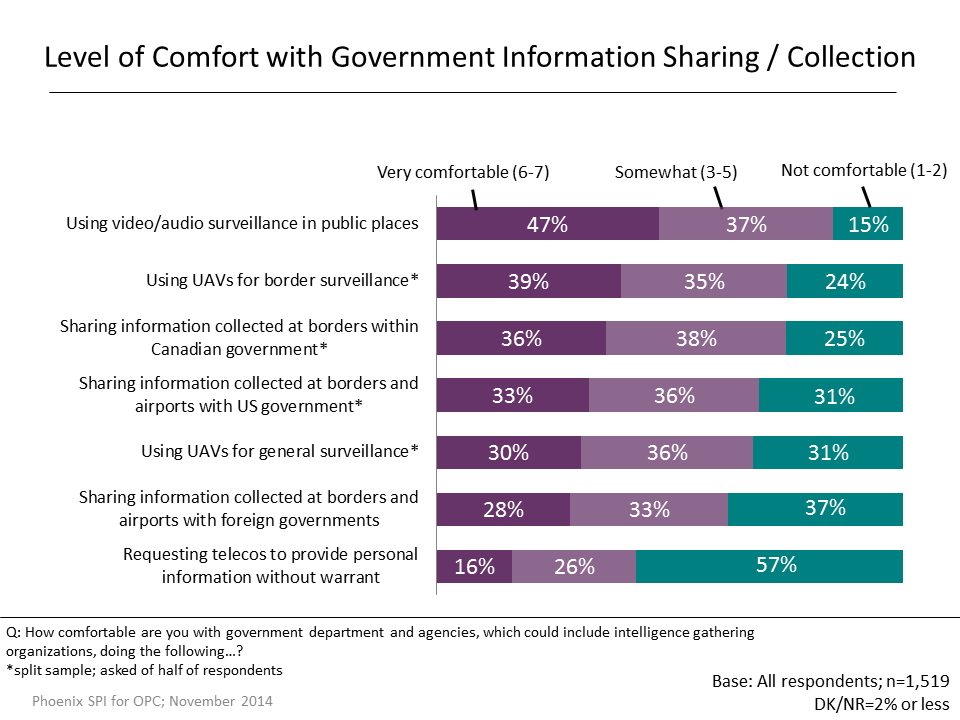
Text version of Figure 37.
Figure 37. Level of Comfort with Government Information Sharing / Collection
Question: How comfortable are you with government departments and agencies, which include intelligence gathering organizations, doing the following....?
| Question | Very Comfortable (6-7) | Somewhat(3-5) | Not comfortable (1-2) |
|---|---|---|---|
| Using video/audio surveillance in public places | 47% | 37% | 15% |
| Using UAVs for border surveillance* | 39% | 35% | 24% |
| Sharing Information collected at borders within Canadian government* | 36% | 38% | 25% |
| Sharing information collected at borders and airports with US government | 33% | 36% | 31% |
| Using UAVs for general surveillance* | 30% | 36% | 31% |
| Sharing information collected at borders and airports with foreign governments | 28% | 33% | 37% |
| Requesting telecos to provide personal information without warrant | 16% | 26% | 57% |
* split samples; asked of half of respondents
Base: All respondents; n=1,519
DK/NR= 2% or less
When it comes to other types of information collection, Canadians are more likely to be comfortable with the use of unmanned aerial vehicles (UAVs), or drones, to conduct border surveillance (74% are at least somewhat comfortable) than to conduct general surveillance over protests (66%). Focusing on personal information collected at borders and airports, Canadians are more comfortable with their personal information being shared with the Canadian (74%) or U.S. (69%) governments than with foreign governments or authorities (61%).
Appendix
Annex 1: Detailed Methodology
To address the research objectives, a 16-minute random digit dialing (RDD) telephone survey was conducted with a nationally representative sample of 1,519 Canadian residents, 16 years of age or older.
Sampling
An overlapping dual-frame (landline and cell-phone) sample was used in order to achieve maximum coverage and minimize the potential for non-response bias.
The sample frame was geographically disproportionate to improve the accuracy of regional results.
| Strata | Completed Interviews |
|---|---|
| Atlantic | 204 |
| Quebec | 351 |
| Ontario | 403 |
| Prairies | 357 |
| British Columbia | 204 |
| Total | 1,519 |
Based on a sample of this size, the overall results can be considered to be accurate within ±2.5%, 19 times out of 20. The margin of error is greater for results pertaining to subgroups of the total sample.
Pre-test
A telephone pre-test was conducted in English and French, with 10 interviews in each official language (per Government of Canada Standards). A summary report of the pre-test is available under separate cover.
Fieldwork
The data collection was carried out by Elemental Data Collection Inc. (EDCI), under subcontract to Phoenix, from October 21st and November 10th, 2014. The overall response rate was 9%Footnote 1 (10% for the landline sample and 5% for the cell sample).
Weighting
Weighting adjustments were applied to the survey data to ensure that the data are representative of the 16+ population of Canada. Specifically, the data were weighted by region, gender and age according to the most recent Statistics Canada census of the population.
Call Disposition Table
| Call Disposition | Total | Landline | Cell |
|---|---|---|---|
| Total Numbers Attempted | 33664 | 18109 | 15555 |
| Out-of-scope - Invalid | 11493 | 2944 | 8549 |
| Unresolved (U) | 13216 | 8280 | 4936 |
| No answer/Answering machine | 13216 | 8280 | 4936 |
| In-scope - Non-responding (IS) | 7062 | 5369 | 1693 |
| Language barrier | 230 | 221 | 9 |
| Incapable of completing (ill/deceased) | 90 | 82 | 8 |
| Callback (Respondent not available) | 883 | 648 | 235 |
| Refusal | 5755 | 4335 | 1420 |
| Termination | 104 | 83 | 21 |
| In-scope - Responding units (R) | 1893 | 1516 | 377 |
| Completed Interview | 1519 | 1213 | 306 |
| NQ - Quota Full - Gender | 254 | 230 | 24 |
| NQ - Industry | 93 | 62 | 31 |
| NQ - Age | 27 | 11 | 16 |
| Response Rate | 8.54 | 10.00 | 5.38 |
Annex 2: Questionnaire
Hello, my name is [Interviewer's name]. I'm calling on behalf of Phoenix, a public opinion research company. We're conducting a survey for the Government of Canada to explore issues of interest to Canadians. The survey should take only 15 minutes to complete. Participation is voluntary and your answers will remain anonymous.
CELL SAMPLE SKIP A, GO TO CS1
A. I'd like to speak to someone in your household who is 16 years of age or older. Is that you?
Yes CONTINUE
No ASK TO SPEAK TO ELIGIBLE PERSON
REPEAT INTRO
Refused (VOLUNTEERED) THANK/DISCONTINUE
CELL SAMPLE ONLY:
CS1. Have I reached you on your cell phone?
Yes CONTINUE
No GO TO B
CS2. Are you 16 years of age or older?
Yes CONTINUE
No THANK/DISCONTINUE
CS3. Are you in a place where you can safely talk on the phone and answer my questions?
Yes GO TO B
No CONTINUE
CS4. When would it be more convenient for me to call back?
Schedule call-back if possible (time/day):
B. Do you, or does anyone in your family or household, work in any of the following areas? [READ LIST]
Advertising or Market Research THANK/DISCONTINUE
The media (i.e. TV, radio, newspapers) THANK/DISCONTINUE
An elected official THANK/DISCONTINUE
* THOSE WHO ARE NOT ELIGIBLE: Thank you for your willingness to take part in this survey, but you do not meet the eligibility requirements of this study.
INTERVIEWER AND PROGRAMMING NOTES:
RESEARCH VALIDITY: IF RESPONDENT QUESTIONS THE VALIDITY OF THE RESEARCH, INVITE RESPONDENT TO CALL THE NATIONAL SURVEY REGISTRATION SYSTEM (SEE NOTE BELOW).
SURVEY REGISTRATION SYSTEM: IF RELEVANT, INFORM RESPONDENT ABOUT NATIONAL SURVEY REGISTRATION SYSTEM:
The registration system has been created by the survey research industry to allow the public to verify that a survey is legitimate, get information about the survey industry or register a complaint. The registration system's toll-free phone number is 1-888-602-6742 EXT. 8728. (www.mria-arim.ca)
IF ASKED ABOUT THE NATIONAL DO NOT CALL LIST: Calls made for the purpose of market research, polls or surveys are not considered telemarketing calls. Organizations making these types of calls are not required to register with the National Do Not Call List. The National Do Not Call List toll-free telephone number is 1-866-580-3625
SECTION HEADINGS SHOULD NOT BE READ TO RESPONDENTS.
REVEAL THE NAME OF THE CLIENT AGENCY THAT COMMISSIONED THE SURVEY AT THE END OF THE SURVEY, IF ASKED - THE OFFICE OF THE PRIVACY COMMISSIONER.
UNLESS OTHERWISE SPECIFIED, ALL QUESTIONS IN THE SURVEY WILL ALLOW FOR 'DON'T KNOW/NO RESPONSE' OPTION.
TRACKING QUESTIONS ARE IDENTIFIED AS FOLLOWS: T11 = QUESTION ASKED IN 2011; T12 = QUESTION ASKED IN 2012.
General Awareness and Perceptions
Many of the questions in this survey are about personal privacy and the protection of personal information. Personal information includes things like your name, age, address, income, and email address, but also information like your opinions, purchasing habits, online activities, and things like that. (IF RESPONDENT IS NOT CLEAR WHAT IS MEANT BY 'PERSONAL INFORMATION', CLARIFY WITH ADDITIONAL INFO FROM INTERVIEWER BRIEFING NOTE)
I will start with a few questions about privacy rights.
1. Are you aware of any federal institutions that help Canadians deal with privacy and the protection of personal information from inappropriate collection, use and disclosure? Would you say you are… [READ LIST] T11
- Clearly aware
- Vaguely aware, or
- Not aware
SKIP NEXT QUESTION IF 'NOT AWARE'
2. Which federal institutions are you aware of? [DO NOT READ. DO NOT PROMPT] T11
- Office of the Privacy Commissioner of Canada/OPC
- Recall agency, but cannot specify name
- Justice agencies (e.g. justice department,courts)
- Law enforcement/security agencies (e.g. RCMP/police/CSIS)
- Canada Revenue Agency
- Consumer protection agencies
- Govt. ombudsman
- Employment and Social Development Canada (formerly HRSDC)
- Banks (general)
- Human rights commission(s)
- Statistics Canada
- Government health agencies (e.g. Health Canada)
- Access to Information & Privacy Act/privacy act/freedom of information/legislation
- CRTC (Canadian Radio-television Telecommunications Commission)
- Other. Please specify:
3. How would you rate your knowledge of your privacy rights under the various laws protecting your personal information? Please use a scale of 1 to 7, where '1' means very poor and '7' means very good. T11 MODIFIED
4. In general, how concerned are you about the protection of your privacy? Please use a scale of 1 to 7, where '1' means not concerned at all, and '7' means extremely concerned. T12
5. Thinking about potential risks to your privacy, how likely do you think it is that each of the following might happen to you? Please use a scale of 1 to 7, where '1' means not likely at all, and '7' means extremely likely. [READ/ROTATE]
- Identity theft, such as someone impersonating you in various situations, whether in the real world or online.
- Someone using your credit or debit card to make unauthorized purchases.
- Someone accessing the personal information on your computer or mobile device without your permission.
6. Technology is constantly evolving, bringing with it new privacy threats. A number of devices and services are starting to emerge, and many could become commonplace in Canada in the near future. Thinking about risks to your personal privacy, how concerned would you be about the following? [READ/ROTATE; SPLIT SAMPLE FOR STATEMENTS B AND C] Please use the same scale of 1 to 7, where '1' means not concerned at all, and '7' means extremely concerned.
- Private citizens' or businesses' use of unmanned aerial vehicles, known as drones, with the ability to take photographs and record video in your neighbourhood.
- Wearable computers, such as smartwatches, pedometers and heart monitors, that collect personal information about you.
- Black boxes used by auto insurance companies to record your driving habits for the purpose of setting the cost of your insurance.
- Results of genetic testing being used for non-health related purposes, such as determining eligibility for insurance or employment.
7. Have you ever actively sought out information about your privacy rights, for example by contacting an organization, visiting a website, or reviewing a publication for guidance? T11
- Yes [GO TO Q7a]
- No [GO TO Q7b]
7a. Where did you go for this information? [DO NOT READ LIST; ACCEPT TWO RESPONSES]
- Federal privacy office/commissioner
- Provincial privacy office/commissioner
- Government (general mention)
- Government website
- Police/law enforcement
- Downloaded a privacy app
- Search engine (e.x., Google)
- Internet/websites (general mention)
- Friends, family, colleagues
- Media (general mention)
- Social media
- Other. [SPECIFY]
7b. If you needed information about your privacy rights, where do you think you would go to find this information? [DO NOT READ LIST; ACCEPT TWO RESPONSES]
- Federal privacy office/commissioner
- Provincial privacy office/commissioner
- Government (general mention)
- Government website
- Police/law enforcement
- Search engine (e.x., Google)
- Internet/websites (general mention)
- Legal counsel
- Friends, family, colleagues
- Media (general mention)
- Social media
- Other. [SPECIFY]
8. Please rate the degree to which you agree or disagree with the following statements, using a scale of 1 to 7, where '1' means strongly disagree, and '7' means strongly agree. (READ/ROTATE) T11 MODIFIED
- I feel I have less protection of my personal information in my daily life than I did 10 years ago.
- I feel confident that I have enough information to know how new technologies might affect my personal privacy.
- I have little expectation of privacy today, either online or in the real world, bcause there are so many things that can compromise it.
- I have been negatively affected as a result of an organization misusing, sharing or losing my personal information.
- I feel confident that when I share my personal information with an organization, I understand how it will be used.
ROTATE NEXT TWO QUESTIONS
9. In your opinion, how seriously do businesses take their responsibility to protect consumer personal information? Please use a scale from 1 to 7, where 1 is not at all seriously, 7 is extremely seriously, and 4 is somewhat seriously. T11
10. In your opinion, how seriously does the federal government take its responsibility to protect citizen personal information? Please use a scale from 1 to 7, where 1 is not at all seriously, 7 is extremely seriously and 4 is somewhat seriously. T11
Online and Mobile Privacy
11. Which of the following devices do you use to access the Internet? [READ LIST; ACCEPT ALL THAT APPLY]
- A desktop or laptop computer
- A smartphone, or
- A tablet
- VOLUNTEERED: Some other type of mobile device
- VOLUNTEERED: Do not use the Internet [SKIP THIS SECTION]
These next questions deal with issues related to online and mobile privacy.
12. Many Internet services, such as social media sites, blogs, or websites, allow people to post information about themselves. How concerned are you about posting the following types of personal information online? Please use a scale of 1 to 7, where '1' means not concerned at all, and '7' means extremely concerned. T12 MODIFIED
- Contact information, such as your name, telephone, address, or email address.
- Personal photos and videos.
- Information about your social activities.
- Information about your location, such as where you are at a given time, or where and when a photo was taken.
- Personal opinions about people, issues and things.
13. When you think about the information available about you online, please tell me how concerned you are about each of the following? How about...? (READ/ROTATE LIST) Please use a scale of 1 to 7, where '1' means not concerned at all, and '7' means extremely concerned. T11 MODIFIED
- Marketing companies using this information to analyse your likes and dislikes.
- Companies or organizations using this information to determine your suitability for a job or promotion.
- Companies or organizations using this information to make decisions about you, such as for an insurance claim or health coverage.
- Governments using this information for other purposes, such as to verify claims for social benefits or payment of taxes.
- Law enforcement and security agencies collecting it for government surveillance purposes.
- The impact on your personal reputation as more information is collected, assembled, and made into profiles about you by companies and organizations.
14. Have you visited a website and been presented with ads you thought were tailored to your interests?
- Yes
- No [SKIP NEXT QUESTION]
15. What did you think of those targeted online ads? Please rate the extent to which you agree or disagree with the following statements using a scale of 1 to 7, where '1' means strongly disagree, and '7' means strongly agree:
- The ads were useful to me.
- The ads made me feel like I have less privacy online.
- I prefer randomized not targeted online ads.
ASK MOBILE DEVICE USERS [BASED ON Q11] NEXT THREE QUESTIONS
Smartphones and tablets are capable of storing a variety of information about you, from your email and text messages, to your photos and videos, to your banking information or even your location.
16. Thinking about the personal information stored on your smartphone or tablet, if it was stolen or lost, how concerned would you be that someone might use the personal information in a way that negatively affects you or someone you know? Please use a scale of 1 to 7, where '1' means not concerned at all, and '7' means extremely concerned.
17. Please tell me if you do any of the following. Do you…? [ROTATE LIST; RECORD YES/NO] T11 MODIFIED
- Use your personal technological device such as a tablet, USB flash drive or hard drive, laptop, or smartphone for work purposes.
- Use a password lock on your smartphone or tablet.
- Adjust settings on your smartphone or tablet to limit the amount of personal information that you share with others.
18. Have you ever……[RECORD YES/NO]
- a. decided not to install, or uninstalled, an app because you were concerned about the personal information you would have to provide? T12 MODIFIED
- b. turned off the location tracking feature on your mobile device because you were concerned about others accessing that information? T12
Personal Information Management
19. Recently there have been a number of incidents reported in the news of sensitive personal information, such as private photos and debit or credit information, being lost, stolen or made public. To what extent has this affected your willingness to share personal information with organizations? Please use a scale of 1 to 7, where 1 is not at all, and 7 is a great deal.
20. Have you ever refused to provide an organization with your personal information?
- Yes
- No
21. In the last year or so, have you asked a company how it uses your personal information or protects your privacy before doing business with them?
- Yes
- No [SKIP NEXT QUESTION]
22. What was the outcome….Did you choose to do business with this company because of their privacy practices, or did you choose not to do business with this company because of privacy concerns?
23. Would you choose to do business with a company specifically because it…: [RECORD YES/NO]
- …does not collect your personal information?
- …has a good reputation for its privacy practices?
DO NOT ASK NON-INTERNET USERS
24. Have you, or a family member or friend, had anything posted online about you that negatively affected your life in any way? This could be something you posted yourself or someone else posted about you, and could be a picture or words or any other type of online posting.
- Yes
- No [SKIP NEXT TWO QUESTIONS]
25. What did you or they do about it? [DO NOT READ LIST]
- Nothing
- Removed the online post
- Asked the person who posted the information to remove it
- Asked the website on which the information was posted to remove it
- Searched online for information
- Contacted the police
- Called a lawyer
- Other [SPECIFY]
26. Were you or they able to resolve the issue to your satisfaction?
- Yes
- No
Government, National Security and Public Safety
Changing topics,
27. How comfortable are you with government department and agencies, which could include intelligence gathering organizations, doing the following…? How about…? [READ/ROTATE LIST] Please use a scale of 1 to 7, where '1' means not comfortable at all and '7' means extremely comfortable.
- Sharing personal information collected at borders and airports with [SPLIT SAMPLE: the United States government / foreign governments or authorities].
- Sharing personal information collected at borders and airports with other Canadian government departments and agencies.
- Using unmanned aerial vehicles, or drones, to conduct border surveillance.[SPLIT SAMPLE]
- Using unmanned aerial vehicles, or drones, to conduct general surveillance over protests. [SPLIT SAMPLE]
- Requesting telecommunications companies to provide personal information they hold about individuals without a warrant.
- Using video or audio surveillance cameras in public places for the purposes of law enforcement and public safety.
28. In the past year or so, have you seen, read or heard anything about surveillance and intelligence gathering activities for the purposes of national security?
- Yes
- No [SKIP NEXT TWO QUESTIONS]
- VOLUNTEREED: Maybe
29. Thinking about this issue, how much do you understand about what information is collected, used, or disclosed by intelligence gathering activities in Canada? Would you say….a great deal, a moderate amount, not much, or nothing at all?
30. Do you think these agencies should have to explain their activities to Canadians and how they affect the privacy of Canadians?
- Yes
- No
Finally,
31. Please rate the extent to which you agree or disagree with the following statements, using a scale of 1 to 7, where '1' means strongly disagree, and '7' means strongly agree. [READ; DO NOT ROTATE]
- I don't have a good understanding of what the government does with the personal information it collects.
- I feel confident that when I share my personal information with the government it will not be misused, lost or stolen.
- If I have concerns about the government's handling of my personal information, I am confident the government will take them seriously.
Demographics
The last few questions are for classification purposes only.
32. In what year were you born?
Record year:
33. What language do you speak most often at home?
- English
- French
- Other
34. Which of the following diplomas or degrees have you completed? [READ LIST; ACCEPT ALL THAT APPLY]
- High school diploma or equivalent
- Registered apprenticeship or other trades certificate or diploma
- College, CEGEP or other non-university certificate or diploma
- University degree, certificate or diploma
- None
- [DO NOT READ] Refused
ASK CELL SAMPLE:
C1. In addition to your cellular telephone, does your household currently have a traditional telephone or landline?
- Yes
- No
ASK LANDLINE SAMPLE:
C2. In addition to your residential landline telephone, do you or someone else in your household also use one or more cell phone numbers?
- Yes
- No
That concludes the survey. Thank you very much for your thoughtful feedback. It is much appreciated.
Alternate versions
- PDF (1.2 MB) Not tested for accessibility
- Date modified:

